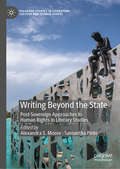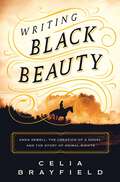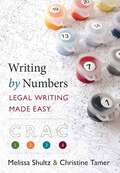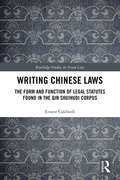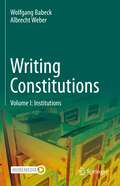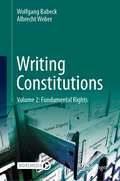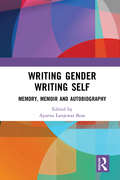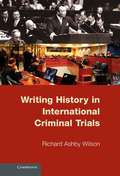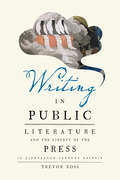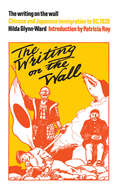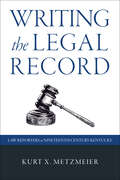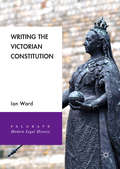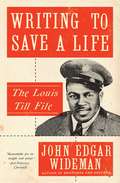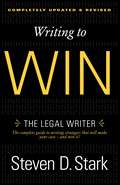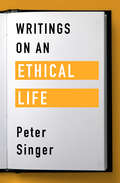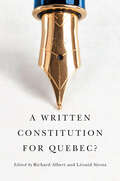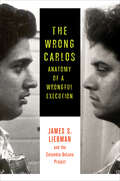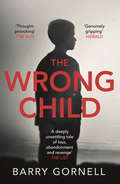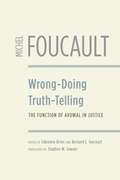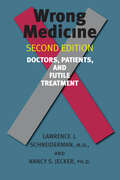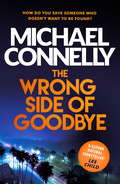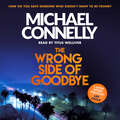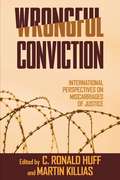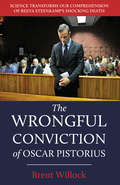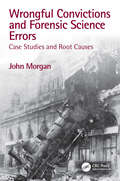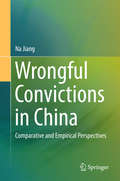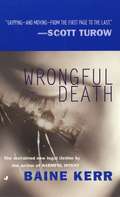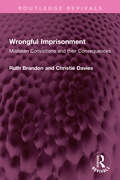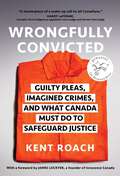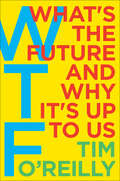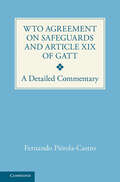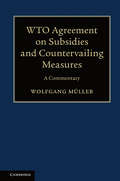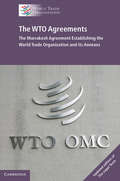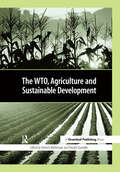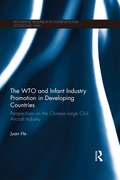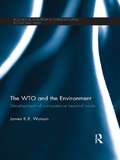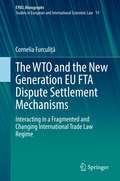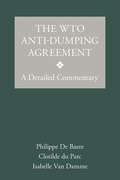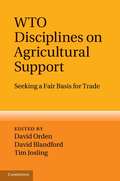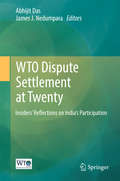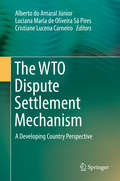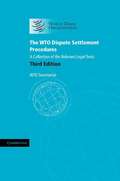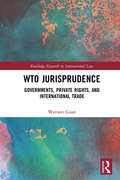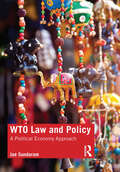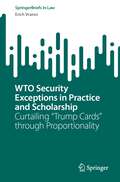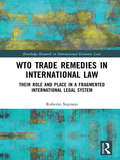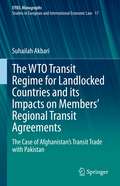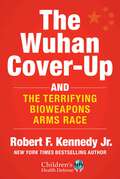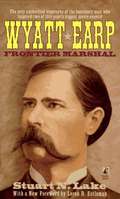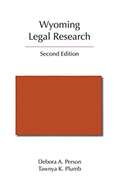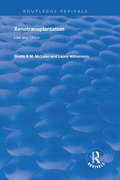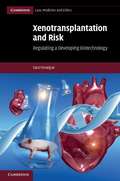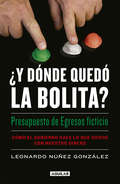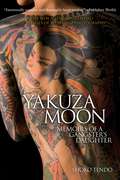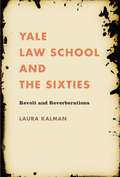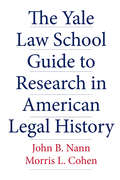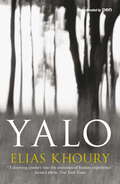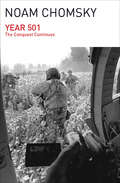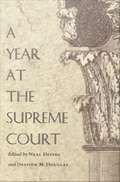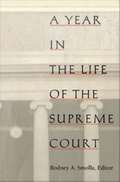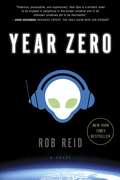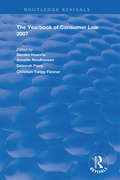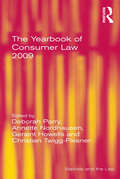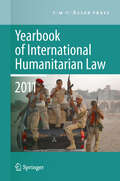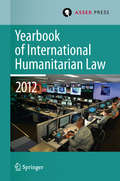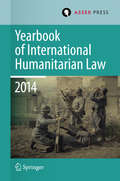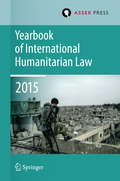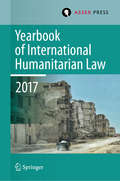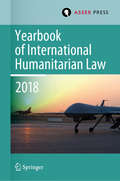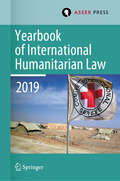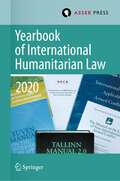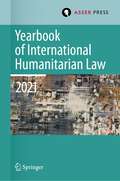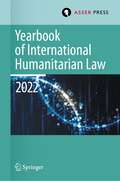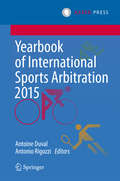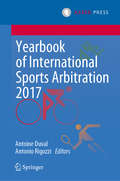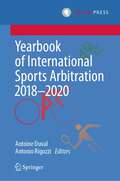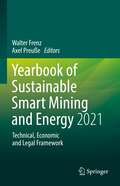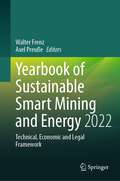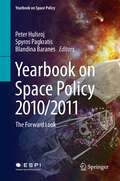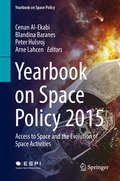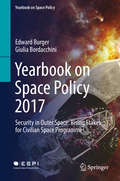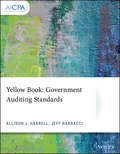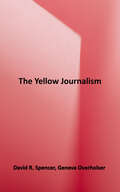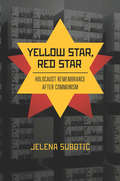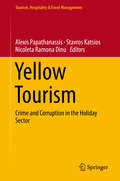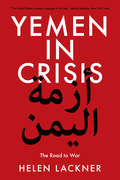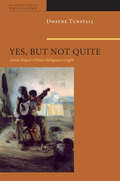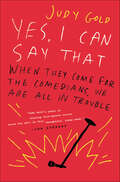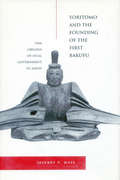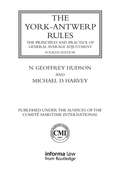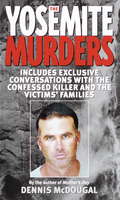- Table View
- List View
Writing Beyond the State: Post-Sovereign Approaches to Human Rights in Literary Studies (Palgrave Studies in Literature, Culture and Human Rights)
by Samantha Pinto Alexandra S. MooreThis book investigates the imaginative capacities of literature, art and culture as sites for reimagining human rights, addressing deep historical and structural forms of belonging and unbelonging; the rise of xenophobia, neoliberal governance, and securitization that result in the purposeful precaritization of marginalized populations; ecological damage that threatens us all, yet the burdens of which are distributed unequally; and the possibility of decolonial and posthuman approaches to rights discourses. The book starts from the premise that there are deep-seated limits to the political possibilities of state and individual sovereignty in terms of protecting human rights around the world. The essays explore how different forms, materials, perspectives, and aesthetics can help reveal the limits of normative human rights and contribute to the cultural production of new human rights imaginaries beyond the borders of state and self.
Writing Black Beauty: Anna Sewell, the Creation of a Novel, and the Story of Animal Rights
by Celia BrayfieldThe story of a remarkable woman who wrote a novel that not only became a classic, but also changed the way human society views and treats animals. Born in 1829 to a young Quaker couple, Anna Sewell grew up in poverty in London. She was fourteen when she fell and injured her ankle, which left her permanently disabled. Rejecting the life of a Victorian invalid, she developed an extraordinary empathy with horses, learning to ride side-saddle and to drive a small carriage. Rebellious and independent-minded, Anna suffered periods of severe depression as a young woman. She left the Quaker movement, but remained close friends with the women writers and abolitionists who had been empowered by its liberal principles. It was not until she became terminally ill, aged 51, that she found the courage to write her own book. Tragically, she died just five months after the book was published in 1877. Black Beauty is now recognised as the first anthropomorphic novel, and it had an extraordinary emotional impact on readers of all ages. After modest success in Britain, it was taken up by a charismatic American, George Thorndike Angell, a campaigner against animal cruelty who made it one of the bestselling novels of all time. Using newly discovered archive material, Celia Brayfield shows Anna Sewell developing the extraordinary resilience to overcome her disability, rouse the conscience of Victorian Britain and make her mark upon the world.
Writing By Numbers: Legal Writing Made Easy
by Melissa Shultz Christine TamerGiven the reality that legal writing is difficult for most new law students, Writing by Numbers: Legal Writing Made Easy aims to demystify the writing process by providing concrete formulas for mastering objective and persuasive legal writing. Put simply, at each juncture of your journey to become a proficient legal writer, this book gives you a roadmap to follow, broadly starting with the macro-formula CRAC (Conclusion, Rule, Analysis, and Conclusion) and then moving to micro-formulas for each part of the macro formula. The goal is that you will never find yourself lost―that is, you will never find yourself facing an entirely blank page without direction.
Writing Chinese Laws: The Form and Function of Legal Statutes Found in the Qin Shuihudi Corpus (Routledge Studies in Asian Law)
by Ernest CaldwellThe legal institutions of the short-lived Qin dynasty (221–207 BCE) have been vilified by history as harsh and draconian. Yet ironically, many Qin institutional features, such as written statutory law, were readily adopted by subsequent dynasties as the primary means for maintaining administrative and social control. This book utilizes both traditional texts and archeologically excavated materials to explore how these influential Qin legal institutions developed. First, it investigates the socio-political conditions which led to the production of law in written form. It then goes on to consider how the intended function of written law influenced the linguistic composition of legal statutes, as well as their physical construction. Using a function and form approach, it specifically analyses the Shuihudi legal corpus. However, unlike many previous studies of Chinese legal manuscripts, which have focused on codicological issues of transcription and translation, this book considers the linguistic aspects of these manuscripts and thus their importance for understanding the development of early Chinese legal thought. Writing Chinese Laws will be useful to students and scholars of Chinese Studies, as well as Asian law and history more generally.
Writing Constitutions: Volume I: Institutions
by Wolfgang Babeck Albrecht WeberWriting Constitutions intends to serve as a practical manual for those writing constitutions or interested in their design. It is the first systematic and universal approach to coherently capture concepts and contents of a modern constitution. Volume I breaks each constitutional mechanism into components and offers detailed designs to draft a constitutional clause. This provides lawmakers with the necessary toolkit for writing constitutions and empowers them to strengthen democracies. Writing Constitutions comes in three volumes:- Volume I: Institutions- Volume II: Fundamental Rights- Volume III: Constitutional Principles
Writing Constitutions: Volume 2: Fundamental Rights
by Wolfgang Babeck Albrecht WeberWriting Constitutions intends to serve as a practical manual for those writing constitutions or interested in their design. It is the first systematic and universal approach to coherently capture concepts and contents of a modern constitution. Volume II is a user-friendly guide covering the current best practice in human rights and contains a draft catalogue of human rights. It empowers judges, lawyers, civil rights activists, legislators, and academics to draft and interpret over 70 Human Rights and strengthen democracies. Writing Constitutions comes in three volumes:- Volume I: Institutions- Volume II: Fundamental Rights- Volume III: Constitutional Principles
Writing for Hire
by Catherine L. FiskProfessional writers may earn a tidy living for their work, but they seldom own their writing. Catherine Fisk traces the history of labor relations that defined authorship in film, TV, and advertising in the mid-twentieth century, showing why strikingly different norms of attribution emerged in these overlapping industries.
Writing Gender Writing Self: Memory, Memoir and Autobiography
by Aparna Lanjewar BoseLife Writings/Narratives and studies in gender have been posing critical challenges to fetishizing the manner of canon formations and curriculum propriety. This book engages with these and other challenges turning our customary gaze towards women especially marginal, enabling us to interrogate the established pedagogical practices that accentuates the continuing denial of their agency. Reproduction of the cultural modes of narrativization based on memory and experience becomes a mode of reclaiming the agency. These challenge the homogenising singularity of communitarian notions besides dominant gender constructs using visual, textual, popular, historical, cultural and gender modes enabling one to rethink our received theoretical frameworks. This edited volume brings together 21 essays on life writings produced by both well-established and emerging writers in the field of literature written by scholars from countries like India, Pakistan, China, USA, Iran, Yemen and Australia, to name just a few. Many of the essays in this book focus on how the progress of the self is often impeded by the society it finds itself in. With an enlightening foreword by Dr. E.V. Ramakrishnan and a detailed, critical introduction by Aparna Lanjewar Bose, this anthology is useful for all those who wish to learn more about this genre of writing.
Writing History in International Criminal Trials
by Richard Ashby WilsonWhy do international criminal tribunals write histories of the origins and causes of armed conflicts? Richard Ashby Wilson conducted research with judges, prosecutors, defense attorneys and expert witnesses in three international criminal tribunals to understand how law and history are combined in the courtroom. Historical testimony is now an integral part of international trials, with prosecutors and defense teams using background testimony to pursue decidedly legal objectives. In the Slobodan Milošević trial, the prosecution sought to demonstrate special intent to commit genocide by reference to a long-standing animus, nurtured within a nationalist mindset. For their part, the defense called historical witnesses to undermine charges of superior responsibility, and to mitigate the sentence by representing crimes as reprisals. Although legal ways of knowing are distinct from those of history, the two are effectively combined in international trials in a way that challenges us to rethink the relationship between law and history.
Writing in Public: Literature and the Liberty of the Press in Eighteenth-Century Britain
by Trevor RossWhat is the role of literary writing in democratic society?Building upon his previous work on the emergence of "literature," Trevor Ross offers a history of how the public function of literature changed as a result of developing press freedoms during the period from 1760 to 1810. Writing in Public examines the laws of copyright, defamation, and seditious libel to show what happened to literary writing once certain forms of discourse came to be perceived as public and entitled to freedom from state or private control. Ross argues that—with liberty of expression becoming entrenched as a national value—the legal constraints on speech had to be reconceived, becoming less a set of prohibitions on its content than an arrangement for managing the public sphere. The public was free to speak on any subject, but its speech, jurists believed, had to follow certain ground rules, as formalized in laws aimed at limiting private ownership of culturally significant works, maintaining civility in public discourse, and safeguarding public deliberation from the coercions of propaganda. For speech to be truly free, however, there had to be an enabling exception to the rules. Since the late eighteenth century, Ross suggests, the role of this exception has been performed by the idea of literature. Literature is valued as the form of expression that, in allowing us to say anything and in any form, attests to our liberty. Yet, paradoxically, it is only by occupying no definable place within the public sphere that literature can remain as indeterminate as the public whose self-reinvention it serves.
The Writing on the Wall
by Hilda Glynn-Ward Patricia RoyWith tales of a gruesome murder, a typhoid epidemic, corrupt politicians, and a Japanese invasion, The Writing on the Wall was intended to shock its readers when it was published in 1921. Thinly disguised as a novel, it is a propaganda tract exhorting white British Columbians to greater vigilance to prevent greedy politicians from selling out to the Chinese and Japanese. It was also designed to convince eastern Canada of British Columbia's need for protections against an onslaught of the 'yellow peril.'This novel is not exceptional in its extreme racism; it reiterates almost every anti-oriental cliché circulating in British Columbia at the time of its publication. While modern readers will find the story horrifying and unbelievable, it is in fact based on real incidents. Many of the views expressed were only exaggerated versions of ideas held throughout the country about non-Anglo-Saxon immigrants. The Writing on the Wall is a vivid illustration of the fear and prejudice with which immigrants were regarded in the early twentieth century.
Writing the Legal Record: Law Reporters in Nineteenth-Century Kentucky
by Kurt X. MetzmeierAny student of American history knows of Washington, Jefferson, and the other statesmen who penned the documents that form the legal foundations of our nation, but many other great minds contributed to the development of the young republic's judicial syst
Writing the Victorian Constitution (Palgrave Modern Legal History Ser.)
by Ian WardThis book charts the writing of the English constitution through the work of four of the most influential jurists in the history of English constitutional thought—Edmund Burke, Thomas Babington Macaulay, Walter Bagehot and Albert Venn Dicey. Stretching from the French Revolution to the death of Queen Victoria, their writing is both representative of and formative to the Victorian constitution. Ian Ward traces how constitutional writing changed over the course of the long nineteenth century, from the poetics of Burke and the romance of Macaulay, to the pragmatism of Bagehot and the jurisprudence of Dicey. A century on, our perception of the English constitution is still shaped by this contested history.
Writing to Save a Life: The Louis Till File (Canons #84)
by John Edgar WidemanAn award-winning writer traces the life of the father of iconic Civil Rights martyr Emmett Till--a man who was executed by the Army ten years before Emmett's murder. An evocative and personal exploration of individual and collective memory in America by one of the most formidable Black intellectuals of our time.In 1955, Emmett Till, aged fourteen, traveled from his home in Chicago to visit family in Mississippi. Several weeks later he returned, dead; allegedly he whistled at a white woman. His mother, Mamie, wanted the world to see what had been done to her son. She chose to leave his casket open. Images of her brutalized boy were published widely. While Emmett's story is known, there's a dark side note that's rarely mentioned. Ten years earlier, Emmett's father was executed by the Army for rape and murder. In Writing to Save a Life, John Edgar Wideman searches for Louis Till, a silent victim of American injustice. Wideman's personal interaction with the story began when he learned of Emmett's murder in 1955; Wideman was also fourteen years old. After reading decades later about Louis's execution, he couldn't escape the twin tragedies of father and son, and tells their stories together for the first time. Author of the award-winning Brothers and Keepers, Wideman brings extraordinary insight and a haunting intimacy to this devastating story. An amalgam of research, memoir, and imagination, Writing to Save a Life is completely original in its delivery--an engaging and enlightening conversation between generations, the living and the dead, fathers and sons. Wideman turns seventy-five this year, and he brings the force of his substantial intellect and experience to this beautiful, stirring book, his first nonfiction in fifteen years.
Writing to Win: The Legal Writer
by Steven D. StarkFrom a master teacher, a results-oriented approach to powerful legal writing that communicates, that persuades--and that wins.Of all the professions, the law has the most deserved reputation for opaque, jargon-clogged writing. Legal education, which focuses on judicial opinions, not instruments of persuasion, is partly to blame. Yet forceful writing is one of the most potent weapons of legal advocacy. In Writing to Win, Steve Stark, a former teacher of writing at Harvard Law, who has taught thousands of aspiring and practicing lawyers, has written the only book on the market that applies the universal principles of vigorous prose to the job of making a case--and winning it.Writing to Win focuses on the writing of lawyers, not judges, and includes dozens of examples of effective (and ineffective) real-life writing--as well as models drawn from advertising, journalism, and fiction. It deals with the problems lawyers face in writing, from organization to strengthening and editing prose; teaches ways of improving arguments; addresses litigation and technical writing in all its forms; and covers the writing attorneys must perform in their practice, from memos and letters to briefs and contracts. Each chapter opens with a succinct set of rules for easy reference.No other legal writing book on the market is as practical, as focused on results, as well written as Writing to Win.From the Trade Paperback edition.
Writings on an Ethical Life (Isnm Ser. #Vol. 138)
by Peter SingerThe essential collection of writings by one of the most visionary and daring philosophers of our time Since bursting sensationally into the public consciousness in 1975 with his groundbreaking work Animal Liberation, Peter Singer has remained one of the most provocative ethicists of the modern age. His reputation, built largely on isolated incendiary quotations and outrage-of-the-moment news coverage, has preceded him ever since. Aiming to present a more accurate and thoughtful picture of Singer's pioneering work, Writings on an Ethical Life features twenty-seven excerpts from some of his most lauded and controversial essays and books. The reflections on life, death, murder, vegetarianism, poverty, and ethical living found in these pages come together in a must-read collection for anyone seeking a better understanding of the issues that shape our world today. This ebook features an illustrated biography of Peter Singer, including rare photos from the author's personal collection.
A Written Constitution for Quebec? (Democracy, Diversity, and Citizen Engagement Series)
by Richard Albert and Léonid SirotaNo province in Canada has codified a written constitution, and whether Quebec should be the first remains a controversial question. A Written Constitution for Quebec? enters into the debate, drawing a roadmap through the legal, political, and constitutional terrain of the issue. Leading scholars each take their own position in the debate, examining the issue from various sides and exploring the forms and limits of a codified Quebec constitution by asking whether Quebec should adopt a written constitution, how the province might go about it, and what such a document might achieve. Along with a comprehensive introduction to constitutional codification and how it relates to Quebec, the book opens with a proposal for a written constitution, with the analyses that follow expressing a diversity of views on the feasibility and desirability of a written constitution for the province. An array of perspectives through the lenses of Indigenous inclusion and reconciliation, interculturalism and democratic constitutionalism, and insights from other federal and plurinational states – are included in this wide-ranging volume. Taking a doctrinal, historical, theoretical, and comparative approach, A Written Constitution for Quebec? extensively addresses Quebec’s constitutional future in Canada.
The Wrong Carlos: Anatomy of a Wrongful Execution
by James Liebman Shawn Crowley Andrew Markquart Lauren Rosenberg Lauren White Daniel ZharkovskyIn 1989, Texas executed Carlos DeLuna, a poor Hispanic man with childlike intelligence, for the murder of Wanda Lopez, a convenience store clerk. His execution passed unnoticed for years until a team of Columbia Law School faculty and students almost accidentally chose to investigate his case and found that DeLuna almost certainly was innocent. They discovered that no one had cared enough about either the defendant or the victim to make sure the real perpetrator was found. Everything that could go wrong in a criminal case did. This book documents DeLuna's conviction, which was based on a single, nighttime, cross-ethnic eyewitness identification with no corroborating forensic evidence. At his trial, DeLuna's defense, that another man named Carlos had committed the crime, was not taken seriously. The lead prosecutor told the jury that the other Carlos, Carlos Hernandez, was a "phantom" of DeLuna's imagination. In upholding the death penalty on appeal, both the state and federal courts concluded the same thing: Carlos Hernandez did not exist.The evidence the Columbia team uncovered reveals that Hernandez not only existed but was well known to the police and prosecutors. He had a long history of violent crimes similar to the one for which DeLuna was executed. Families of both Carloses mistook photos of each for the other, and Hernandez's violence continued after DeLuna was put to death. This book and its website (thewrongcarlos.net) reproduce law-enforcement, crime lab, lawyer, court, social service, media, and witness records, as well as court transcripts, photographs, radio traffic, and audio and videotaped interviews, documenting one of the most comprehensive investigations into a criminal case in U.S. history. The result is eye-opening yet may not be unusual. Faulty eyewitness testimony, shoddy legal representation, and prosecutorial misfeasance continue to put innocent people at risk of execution. The principal investigators conclude with novel suggestions for improving accuracy among the police, prosecutors, forensic scientists, and judges.
The Wrong Carlos: Anatomy of a Wrongful Execution
by James S. Liebman The Columbia DeLuna ProjectA Columbia Law School team&’s in-depth examination of one man&’s 1989 wrongful conviction and execution for murder. In 1989, Texas executed Carlos DeLuna, a poor Hispanic man with childlike intelligence, for the murder of Wanda Lopez, a convenience store clerk. His execution passed unnoticed for years until a team of Columbia Law School faculty and students chose to investigate his case and found that DeLuna almost certainly was innocent. No one had cared enough about either the defendant or the victim to make sure the real perpetrator was found. Everything that could go wrong in a criminal case did. DeLuna&’s conviction was based on a single, nighttime, cross-ethnic eyewitness identification with no corroborating forensic evidence. At his trial, DeLuna&’s defense—that another Carlos had committed the crime—was not taken seriously. The lead prosecutor told the jury that the other Carlos, Carlos Hernandez, was a &“phantom&” of DeLuna&’s imagination. In upholding the death penalty on appeal, both the state and federal courts concluded the same thing: Carlos Hernandez did not exist. However, he not only existed, but also had a long history of violent crimes . . . This book and its website (thewrongcarlos.net) reproduce law-enforcement, crime lab, lawyer, court, social service, media, and witness records, as well as court transcripts, photographs, radio traffic, and audio and videotaped interviews, documenting one of the most comprehensive investigations into a criminal case in US history. &“This book will become a classic in the field.&” —Austin Sarat, Amherst College &“[An] infuriating yet engrossing book on wrongful conviction...An important critique of our legal system.&” —Publishers Weekly
The Wrong Child: A gripping thriller you won't be able to put down
by Barry GornellHow far would you go to protect your child?When tragedy strikes in a small Scottish village, everyone in the community is affected.Most people believe one child is to blame for what happened.But could a young boy really be responsible? And what lengths will his parents go to protect him?THE WRONG CHILD is the most thought-provoking novel of 2018, perfect for fans of WE NEED TO TALK ABOUT KEVIN by Lionel Shriver and MY ABSOLUTE DARLING by Gabriel Tallent.****************READERS ARE CALLING THE WRONG CHILD 'UNFORGETTABLE':'Amazing' - Amazon 5* review'A great page-turner!' Amazon 5* review'Hopefully it will receive the wider audience it so richly deserves' - Amazon 5* review'Challenges your notions and ideals of morality' - Amazon review'Will stick with you long after you finish it!' Amazon review****************What the critics are saying about THE WRONG CHILD:'A thought-provoking read' - THE SUN'Genuinely gripping' - THE HERALD'A study of guilt and grief' - DAILY MAIL'Brilliant, but dark as hell' - METRO'Astonishing' - PSYCHOLOGIES'So visceral it seeps into your pores' - DAILY RECORD'Stunning. Macabre, unsettling and beautifully poetic' - BRIAN CONAGHAN, Costa Award winning author
Wrong-Doing, Truth-Telling: The Function of Avowal in Justice
by Michel Foucault edited by Fabienne Brion Bernard E. Harcourt translated by Stephen W. SawyerThree years before his death, Michel Foucault delivered a series of lectures at the Catholic University of Louvain that until recently remained almost unknown. These lectures--which focus on the role of avowal, or confession, in the determination of truth and justice--provide the missing link between Foucault's early work on madness, delinquency, and sexuality and his later explorations of subjectivity in Greek and Roman antiquity. Ranging broadly from Homer to the twentieth century, Foucault traces the early use of truth-telling in ancient Greece and follows it through to practices of self-examination in monastic times. By the nineteenth century, the avowal of wrongdoing was no longer sufficient to satisfy the call for justice; there remained the question of who the "criminal" was and what formative factors contributed to his wrong-doing. The call for psychiatric expertise marked the birth of the discipline of psychiatry in the nineteenth and twentieth centuries as well as its widespread recognition as the foundation of criminology and modern criminal justice. Published here for the first time, the 1981 lectures have been superbly translated by Stephen W. Sawyer and expertly edited and extensively annotated by Fabienne Brion and Bernard E. Harcourt. They are accompanied by two contemporaneous interviews with Foucault in which he elaborates on a number of the key themes. An essential companion to "Discipline and Punish," "Wrong-Doing, Truth-Telling" will take its place as one of the most significant works of Foucault to appear in decades, and will be necessary reading for all those interested in his thought.
Wrong Medicine: Doctors, Patients, and Futile Treatment
by Lawrence J. Schneiderman Nancy S. JeckerToo often, patients in American hospitals are subjected to painful, expensive, and futile treatments because of a physician’s notion of medical duty or a family’s demands. Lawrence J. Schneiderman and Nancy S. Jecker renew their call for common sense and realistic expectations in medicine in this revised and updated edition of Wrong Medicine.Written by a physician and a philosopher—both internationally recognized experts in medical ethics—Wrong Medicine addresses key topics that have occupied the media and the courts for the past several decades, including the wrenching Terry Schiavo case. The book combines clear descriptions of ethical principles with real clinical stories to discuss the medical, legal, and political issues that confront doctors today as they seek to provide the best medical care to critically ill patients. The authors have added two chapters that outline theoretical, legislative, judicial, and clinical developments since the first edition. Based on the latest empirical research, Wrong Medicine continues to guide a broad range of health care professionals through the challenges of providing humane end-of-life care.
The Wrong Side of Goodbye (Harry Bosch Series #19)
by Michael ConnellyOnly Harry Bosch can uncover LA's darkest secrets in this new gripping thriller from global bestseller Michael Connelly.'What do you want me to do?' Bosch asked again.'I want you to find someone for me,' Vance said. 'Someone who might not have ever existed.'Harry Bosch is working as a part-time detective in the town of San Fernando outside of Los Angeles, when he gets the invitation to meet with the ageing aviation billionaire Whitney Vance. When he was eighteen Vance had a relationship with a Mexican girl called Vibiana Duarte, but soon after becoming pregnant she disappeared.Now, as he reaches the end of his life, Vance wants to know what happened to Vibiana and whether there is an heir to his vast fortune. And Bosch is the only person he trusts to undertake the assignment.Harry's aware that with such sums of money involved, this could be a dangerous undertaking - not just for himself, but for the person he's looking for - but as he begins to uncover Vibiana's tragic story, and finds uncanny links to his own past, he knows he cannot rest until he finds the truth.
The Wrong Side of Goodbye (Harry Bosch Series #19)
by Michael ConnellyOnly Harry Bosch can uncover LA's darkest secrets in this new gripping thriller from global bestseller Michael Connelly. Read by Titus Welliver, star of BOSCH.'What do you want me to do?' Bosch asked again.'I want you to find someone for me,' Vance said. 'Someone who might not have ever existed.'Harry Bosch is working as a part-time detective in the town of San Fernando outside of Los Angeles, when he gets the invitation to meet with the ageing aviation billionaire Whitney Vance. When he was eighteen Vance had a relationship with a Mexican girl called Vibiana Duarte, but soon after becoming pregnant she disappeared.Now, as he reaches the end of his life, Vance wants to know what happened to Vibiana and whether there is an heir to his vast fortune. And Bosch is the only person he trusts to undertake the assignment.Harry's aware that with such sums of money involved, this could be a dangerous undertaking - not just for himself, but for the person he's looking for - but as he begins to uncover Vibiana's tragic story, and finds uncanny links to his own past, he knows he cannot rest until he finds the truth.(p) 2016 Hachette Audio
Wrongful Conviction: International Perspectives on Miscarriages of Justice
by Martin Killias C. Ronald HuffImperfections in the criminal justice system have long intrigued the general public and worried scholars and legal practitioners. InWrongful Conviction, criminologists C. Ronald Huff and Martin Killias present an important collection of essays that analyzes cases of injustice across an array of legal systems, with contributors from North America, Europe and Israel. Using this cross-national perspective, the volume offers detailed discussions of specific legal systems while also considering issues that transcend national boundaries. Differences in court procedures are explained as contributors ask what role the respective criminal justice systems play in preventing or generating wrongful convictions. Most importantly, this collection includes a number of well-developed public-policy recommendations intended to reduce the instances of courts punishing innocents. It also offers suggestions for compensating more fairly those who are wrongfully convicted.
The Wrongful Conviction of Oscar Pistorius: Science Transforms our Comprehension of Reeva Steenkamp’s Shocking Death
by Brent WillockJust when the world thought Oscar Pistorius’ meteoric rise to Olympic glory and international celebrity had terminated abysmally in prison, Brent Willock’s scientific perspective reopens this gripping narrative for an astonishing re-view.Olympian Oscar Pistorius’ spectacular assent to fame ground to a screeching halt in the wee hours of Valentine’s Day, 2013. Hearing a sound emanating from his bathroom, he grabbed his pistol and he stumbled to the washroom, screaming at the intruders to leave. Fearing someone was about to emerge to harm him and his girlfriend, Reeva, he fired four bullets into the bathroom. Soon he realized he had killed his lover. Horrified, he summoned the authorities. The investigating detective believed this was yet another case of an escalating argument where a man murdered his partner. World opinion is split. Some believe Oscar. Others are convinced he committed a despicable crime of passion.Distinguished clinical psychologist Brent Willock brings an entirely new perspective to bear on these horrific events: that Oscar’s horrific actions occurred while he was in a state of paradoxical sleep, also known as parasomnia. Throughout this book, Willock uses scientific scrutiny and legal precedence to resolve the crucial anomalies surrounding the Oscar Pistorius trial. Willock also discusses how mental health experts and the defense team might have overlooked the hypothesis of parasomnia that could have exonerated Oscar.Millions who followed the Blade Runner’s astonishing achievements, uplifted and inspired by his triumph over physical adversity, were crushed by his precipitous plunge from grace. They were baffled. Even Oscar himself, in a television interview shortly before his sentencing, achingly asked, “I always think, How did this possibly happen? How could this have happened?” At last, Willock’s elegant work responds to these poignant questions that have so plagued and pained Reeva’s family, friends, Oscar, and, indeed, the world.
Wrongful Convictions and Forensic Science Errors: Case Studies and Root Causes
by John MorganForensic Science Errors and Wrongful Convictions: Case Studies and Root Causes provides a rigorous and detailed examination of two key issues: the continuing problem of wrongful convictions and the role of forensic science in these miscarriages of justice. This comprehensive textbook covers the full breadth of the topic. It looks at each type of evidence, historical factors, system issues, organizational factors, and individual examiners. Forensic science errors may arise at any time from crime scene to courtroom. Probative evidence may be overlooked at the scene of a crime, or the chain of custody may be compromised. Police investigators may misuse or ignore forensic evidence. A poorly-trained examiner may not apply the accepted standards of the discipline or may make unsound interpretations that exceed the limits of generally accepted scientific knowledge. In the courtroom, the forensic scientist may testify outside the standards of the discipline or fail to present exculpatory results. Prosecutors may suppress or mischaracterize evidence, and judges may admit testimony that does not conform to rules of evidence. All too often, the accused will not be afforded an adequate defense—especially given the technical complexities of forensic evidence. These issues do not arise in a vacuum; they result from system issues that are discernable and can be ameliorated. Author John Morgan provides a thorough discussion of the policy, practice, and technical aspects of forensic science errors from a root-cause, scientific analysis perspective. Readers will learn to analyze common issues across cases and jurisdictions, perform basic root cause analysis, and develop systemic reforms. The reader is encouraged to assess cases and issues without regard to preconceived views or prejudicial language. As such, the book reinforces the need to obtain a clear understanding of errors to properly develop a set of effective scientific, procedural, and policy reforms to reduce wrongful convictions and improve forensic integrity and reliability. Written in a format and style accessible to a broad audience, Forensic Science Errors and Wrongful Convictions presents a thorough analysis across all of these issues, supported by detailed case studies and a clear understanding of the scientific basis of the forensic disciplines.
Wrongful Convictions in China
by Na JiangThe primary focus of this comparative and empirical work is to address wrongful convictions between China and common-law countries in order to promote a better understanding of wrongful convictions in China's practice with the help of comparative analyses, verifiable and empirical data and case studies. It examines the scope of wrongful convictions and offers new insights into the worldwide movement to prevent them, assesses how far it has progressed and what reforms are most needed. The book suggests that adversarial and inquisitorial systems alike could benefit from this research and learn valuable lessons from one another on how to effectively reduce the risk of wrongful convictions.
Wrongful Death
by Baine KerrA man crushed between locomotives at a Wyoming switching yard... the mass murder of patients in a hospital in the former Yugoslavia. . . the wrongful death of a comatose woman. As attorney Elliot Stone starts piecing together a three-part Chinese puzzle, one question echoes through it all: How can the good do evil?
Wrongful Imprisonment: Mistaken Convictions and their Consequences (Routledge Revivals)
by Ruth Brandon Christie DaviesFirst published in 1973, Wrongful Imprisonment aims to combine the human interest of individual cases of wrongful imprisonment with a general analysis of how and why they occur. It deals in detail with the English system, but also provides comparisons with Scotland, France, and the United States. The authors spent three years collecting material from newspaper reports, trial transcripts, books, lawyers, the Home Office and – most important – interviews with the persons concerned. As a result, they have been able to analyse objectively the existing system of justice; they have isolated and identified the areas in which the system is at fault, and the successive hazards which may confront the innocent man suspected of a criminal offence; they have also revealed the many obstacles which have to be overcome by the wrongfully imprisoned man seeking to establish his innocence and regain his liberty. This topical and convincingly argued book should appeal not only to students of law and sociology, or to lawyers, policemen, criminals, and others involved in the system of criminal justice, but also to the man in the Wormwood Scrubs omnibus.
Wrongfully Convicted: Guilty Pleas, Imagined Crimes, and What Canada Must Do to Safeguard Justice
by Kent RoachA top legal scholar explains Canada&’s national tragedy of wrongful convictions, how anyone could be caught up in them, and what we can do to safeguard justice.Canada&’s legal system has a serious problem: a significant but unknown number of people have been convicted for crimes they didn&’t commit. There are famous cases of wrongful convictions, such as David Milgaard and Donald Marshall Jr., where the system convicted the wrong person for murder. But there are lesser-known cases: people who feel they have no option but to plead guilty, and people convicted of crimes that were imagined by experts or the police that never, in fact, happened. Kent Roach, cofounder of the Canadian Registry of Wrongful Convictions, award-winning author, and law professor, has dedicated his illustrious career to documenting flaws in our justice system. His work reveals that the burden of wrongful convictions falls disproportionately on the disadvantaged, including Indigenous and racialized people, those with cognitive issues, single mothers, and the poor. Wrongfully Convicted raises awareness about wrongful convictions at a time when DNA exonerations are less frequent and the memories of most famous wrongful convictions are fading. Roach makes a compelling case for change that governments have so far lacked the courage to make. They include better legislative regulation of police and forensic experts and the creation of a permanent and independent federal commission both to investigate wrongful convictions and their multiple causes. Roach&’s research and vast knowledge point to systemic failings in our legal system. But he also outlines vital changes that can better prevent and correct wrongful convictions. Until we do, many of the wrongfully convicted are still waiting for the promise of justice. It is an issue that affects all Canadians.
WTF?: What's the Future and Why It's Up to Us
by Tim O'ReillyWTF? can be an expression of amazement or an expression of dismay. In today’s economy, we have far too much dismay along with our amazement, and technology bears some of the blame. In this combination of memoir, business strategy guide, and call to action, Tim O'Reilly, Silicon Valley’s leading intellectual and the founder of O’Reilly Media, explores the upside and the potential downsides of today's WTF? technologies. What is the future when an increasing number of jobs can be performed by intelligent machines instead of people, or done only by people in partnership with those machines? What happens to our consumer based societies—to workers and to the companies that depend on their purchasing power? Is income inequality and unemployment an inevitable consequence of technological advancement, or are there paths to a better future? What will happen to business when technology-enabled networks and marketplaces are better at deploying talent than traditional companies? How should companies organize themselves to take advantage of these new tools? What’s the future of education when on-demand learning outperforms traditional institutions? How can individuals continue to adapt and retrain? Will the fundamental social safety nets of the developed world survive the transition, and if not, what will replace them? O'Reilly is "the man who can really can make a whole industry happen," according to Eric Schmidt, Executive Chairman of Alphabet (Google.) His genius over the past four decades has been to identify and to help shape our response to emerging technologies with world shaking potential—the World Wide Web, Open Source Software, Web 2.0, Open Government data, the Maker Movement, Big Data, and now AI. O’Reilly shares the techniques he's used at O’Reilly Media to make sense of and predict past innovation waves and applies those same techniques to provide a framework for thinking about how today’s world-spanning platforms and networks, on-demand services, and artificial intelligence are changing the nature of business, education, government, financial markets, and the economy as a whole. He provides tools for understanding how all the parts of modern digital businesses work together to create marketplace advantage and customer value, and why ultimately, they cannot succeed unless their ecosystem succeeds along with them.The core of the book's call to action is an exhortation to businesses to DO MORE with technology rather than just using it to cut costs and enrich their shareholders. Robots are going to take our jobs, they say. O'Reilly replies, “Only if that’s what we ask them to do! Technology is the solution to human problems, and we won’t run out of work till we run out of problems." Entrepreneurs need to set their sights on how they can use big data, sensors, and AI to create amazing human experiences and the economy of the future, making us all richer in the same way the tools of the first industrial revolution did. Yes, technology can eliminate labor and make things cheaper, but at its best, we use it to do things that were previously unimaginable! What is our poverty of imagination? What are the entrepreneurial leaps that will allow us to use the technology of today to build a better future, not just a more efficient one? Whether technology brings the WTF? of wonder or the WTF? of dismay isn't inevitable. It's up to us!
WTO Agreement on Safeguards and Article XIX of GATT: A Detailed Commentary
by Fernando Piérola-CastroDrawing upon Fernando Piérola-Castro's extensive experience as a WTO practitioner, this book is a comprehensive and up-to-date overview of safeguard measures. With each chapter exploring a different provision of the agreement, it explores the relevant rules and procedures that govern safeguard investigations, the imposition of measures, the question of consultations and rebalancing and the multilateral transparency requirements of notification. Grounded in relevant case law, this book emphasises practice, logistics and risk management. Without focussing on the practice of any particular jurisdiction, it offers a general framework that can be applied to several domestic laws. It is a practical manual with the view of assisting in day-to-day problems in the handling of safeguard matters.
WTO Agreement on Subsidies and Countervailing Measures: A Commentary
by Wolfgang MüllerPanels and the WTO Appellate Body have rendered a large number of complex and lengthy rulings on the Agreement on Subsidies and Countervailing Measures. The reasoning behind these rulings is often intimately linked to the underlying facts of a particular case and the methods of litigation adopted by the parties. Without guidance, it is difficult to find and research a specific subsidy issue quickly. This book provides an essential article-by-article commentary on the Agreement and sets out the law as it emerges from this body of rulings, providing the legal basis for further analysis of subsidy disciplines within the realms of economics and political science. It also includes a useful summary of the negotiating history and the links to other WTO Agreements such as GATT 1994. This important reference work will appeal to international trade lawyers, government officials, researchers, students of international trade law, business associations and NGOs. Provides an article-by-article commentary of the Agreement in simple language, encouraging a fuller understanding of the Agreement's provisions. Includes an overview of the relevant jurisprudence so that the reader can locate specific areas of interest. Considers relevant scholarly writing, enabling the reader to gain a broader perspective beyond the Agreement itself.
The WTO Agreements: The Marrakesh Agreement Establishing the World Trade Organization and its Annexes
by World Trade OrganizationThis publication contains the text of the WTO's founding agreement, the 1994 Marrakesh Agreement Establishing the World Trade Organization, and its Annexes, including all amendments and additions since its entry into force until September 2017. <P><P>These include an amendment to the WTO's intellectual property agreement (TRIPS Agreement) aimed at improving developing countries' access to medicines, the WTO's Trade Facilitation Agreement, which entered into force in February 2017, an amendment adopted in July 2017 to extend the frequency of peer review periods under the Trade Policy Review Mechanism as of 2019, and the amended Government Procurement Agreement. <P>This publication updates and replaces The Legal Texts: The Results of the Uruguay Round of Multilateral Trade Negotiations, which was first printed in 1994. <P>Includes the complete and official texts of the WTO agreements in one collection.<P> Provides an indispensable guide to all WTO trade-related negotiations.<P> Updates and replaces The Legal Texts: The Results of the Uruguay Round of Multilateral Trade Negotiations (1994).
The WTO, Agriculture and Sustainable Development
by Heinrich Wohlmeyer Theodor QuendlerDespite the Doha declaration of November 2001, the failure to start a new round of global trade negotiations at Seattle in December 1999 and the hostility of protesters to the trade liberalization process and growing global economic and social disparities was a wake-up call for the World Trade Organisation (WTO). The ambitious goal of this ground-breaking book is to identify the strengths and weaknesses of liberalized world trade, in particular in the agricultural sector, and to investigate to what extent the current WTO agreements provide the necessary fail-safe devices to react to trade-related negative impacts on sustainability, environmental protection and food security. The background and interrelationship between the WTO, the tenets of sustainable development and the unique features of the agriculture and forestry sectors are explored, and conclusions regarding the deficits of the world trade system and its conflicts with basic societal goals – such as sustainability – are drawn. Agriculture and forestry have a particular affinity with what the authors call "strong sustainability" and are to be among the major agenda items in forthcoming WTO negotiations. The book proposes that sustainable agricultural production techniques such as integrated and organic farming provide a series of related services to community and environment which could be severely prejudiced by wholesale trade liberalization and the imposition of the large-scale production methods of the mega-trade giants of the USA and Europe. And yet the concept of sustainability is referred to only tangentially in the existing WTO agenda. The WTO, Agriculture and Sustainable Development argues that, without a formal recognition of this failing, the premise that free trade is inherently advantageous for all countries is a falsehood. Further, unfettered liberalization is unsustainable and a social and environmental multilateral framework must be agreed to reinterpret or adapt a host of WTO regulations that are at odds with sustainable development. The core problem is that, under the current system, import duties can only be differentiated by direct goods and services and not by their means of production – sustainable or otherwise. Therefore, a range of environmental policy measures in the agricultural sector, such as the consideration of product life-cycles, the internalization of external costs and a coupling of trade liberalization with ecological obligations are proposed by the authors. In addition, they argue that unsustainable economic short-termism must be curbed and the use of the stick of trade sanctions and the carrot of financial benefits for good environmental performance be permitted to promote sustainable agricultural practices. This book will contribute greatly in addressing the lack of basic theoretical arguments at the intersection between trade and sustainable development – a failing that has already been bemoaned by trade policy-makers. It is highly recommended reading for all those involved or interested in the WTO negotiations, whether from multilateral organizations, governments, industry or civil society.
WTO Analytical Index
by Legal Affairs Division World Trade OrganizationThe WTO Analytical Index is a comprehensive guide to the interpretation and application of the WTO Agreements by the Appellate Body, dispute settlement panels and other WTO bodies. It contains extracts of key pronouncements and findings from tens of thousands of pages of WTO jurisprudence, including panel reports, Appellate Body reports, Article 21.3(c) awards and Article 22.6 decisions. This unique work will be of assistance to anyone working in the field of WTO law, including lawyers, economists, academics and students. It is produced by the Legal Affairs Division of the WTO Secretariat with contributions from other divisions of the Secretariat and the Appellate Body Secretariat. The third edition of the WTO Analytical Index covers developments in WTO law and practice over the period January 1995 to September 2011.
The WTO and Infant Industry Promotion in Developing Countries: Perspectives on the Chinese Large Civil Aircraft (Routledge Research in International Economic Law)
by Juan HeThe charter of the World Trade Organization (WTO) sets the tone that sustainable trade and economic development dominates multilateral trade negotiation and specific working agreements. This book examines the novel challenge for developing countries to upgrade and optimize their industrial structure and trade composition by stimulating genuinely innovative and competitive industrial strength. The book specifically explores the issue of infant industry promotion under the legal framework of the WTO treaties and case law. Taking the regulatory measures and incentives China has used to build up a large civil aircraft supplier, the book evaluates the key trade agreements relevant to infant industry promotional policies and practices, such as product regulations and standards under the 'Agreement on Technical Barriers to Trade', and export promotion policies under the 'Agreement on Subsidies and Countervailing Measures'. Juan He argues that the regulatory room prescribed by the multilateral trade rules of the WTO does not allow adequate space for developing countries to encourage new and technologically advanced areas of production and trade. The author concludes by suggesting ways in which WTO rules could be modified to help enable developing countries’ industrialization. In doing so, the book highlights a need to investigate how localized and international policy trends can be reconciled and enhanced towards the common goal of development. The book will be of great interest to scholars and students of international trade law, Chinese studies, international political economy, and of great use to government agencies responsible for internal trade and industrial policy decisions.
The WTO and International Investment Law Converging Systems (Cambridge International Trade and Economic Law)
by Jürgen KurtzInternational law has historically regulated foreign trade and foreign investment differently. Distinct evolutionary pathways have led to variances in treaty form, institutional culture, and dispute settlement. With their inevitable erosion through the late twentieth to early twenty-first centuries, those weak boundaries have become porous and indefensible. Powerful economic, legal and sociological factors are now pushing the two systems together. In this book, Jürgen Kurtz systematically explores the often complex and little-understood dynamics of this convergence phenomenon. Kurtz addresses the growing connections between international trade and investment law, proposing a theoretically grounded and doctrinally tractable framework to understand the deepening relationship between them. The book also offers reform ideas and possibilities, providing treaty negotiators and other government officials with a set of theoretical insights and doctrinal models that can guide actors in building a justifiable and sustainable level of commonality between the two legal systems. Proposes a new understanding of the relationship between international trade and investment law Offers theoretical justifications for levels of convergence between the two regimes and expands the potential readership base beyond law to other disciplinary areas Identifies vectors by which both legal regimes may achieve systemic maturation and will appeal to treaty negotiators and policy makers who are seeking to reform both systems
The WTO and the Environment: Development of competence beyond trade (Routledge Research in International Economic Law)
by James WatsonThis book is a review of the development of the WTO dispute resolution procedure and the power and influence it has gained over the practises of the member countries as well as in other international treaties. The book addresses the development of environmental competency in the WTO and examines the arguments of those who oppose WTO rule making with impacts on the environment. The WTO’s interactions with multilateral environmental agreements are considered and recent WTO cases including the 2011 US/Mexico tuna dispute and the US sea turtles decision are analysed in detail. In examining how an international organisation which was established with a specific purpose in mind has come to interact in fields beyond its original remit, James Watson demonstrates how the dispute resolution system at the WTO has come to work in a judicialised manner, operating with an informal system of precedent. This has led to the contracting parties placing more reliance on the decisions of the dispute panels and appeal body when considering policy options, with WTO rulings increasingly influencing the behaviour of national legislatures in regard to the environment. The book goes on to make concrete recommendations, based on existing practise in the WTO dispute resolution procedure, which could enhance decision making in environmental cases heard by the WTO. The book argues that this could be achieved with straightforward amendments to the WTO, based on existing practices endorsed under the WTO for other policy considerations. The WTO and the Environment will be of particular interest to academics and students of International and Environmental law.
The WTO and the New Generation EU FTA Dispute Settlement Mechanisms: Interacting in a Fragmented and Changing International Trade Law Regime (European Yearbook of International Economic Law #19)
by Cornelia FurculițăThis book explores interactions between the new generation EU FTA and the WTO dispute settlement mechanisms, adopting an innovative, comprehensive approach. It investigates how the mechanisms potentially could and actually do compete, conflict, and cooperate, focusing not only on the potential negative consequences of fragmentation, but also on how synergies could be enhanced. Thus, unlike the existing literature, which chiefly focuses on conflicting interactions, it considers positive and negative interactions alike. Moreover, the book explores the topic in light of the most recent changes in and challenges to the international trade law regime. Particular attention is paid to how the multilateral and bilateral mechanisms studied interact with regard to the current WTO dispute settlement crisis and the EU-backed multi-party interim appeal arbitration arrangement. Thus, the book provides up-to-date answers to compelling questions. It also examines in detail the new generation EU FTA dispute settlement mechanisms, an aspect which has not been the subject of thorough research to date.The book pursues an interdisciplinary approach, combining legal methodology, international relations and political science theories with interviews. Given its scope, the book will appeal to researchers and scholars whose work involves international trade law issues. However, it will also be of interest to general international law academics, as it touches upon such issues as fragmentation, forum shopping, and general rules of interpretation. Furthermore, by analysing and presenting proposals with regard to the new generation EU FTAs, it will also be pertinent to the work of EU policymakers and researchers studying EU trade law.
The WTO Anti-Dumping Agreement: A Detailed Commentary
by Philippe De Baere Clotilde du Parc Isabelle Van DammeA unique article-by-article commentary on the WTO Anti-Dumping Agreement, offering an essential and comprehensive insight into WTO case-law. This commentary is an indispensable reference tool for government officials, practitioners and academics working on anti-dumping issues. The commentary's structure allows the reader to identify immediately which disputes are relevant for the interpretation of each provision. It offers a clear analysis of the applicable rules and a comprehensive explanation of what, as a result of the WTO case-law, those rules mean. This commentary has been written by practitioners who have all been directly involved in a large number of WTO disputes and who have extensive experience in anti-dumping investigations and in challenging anti-dumping determinations before the WTO and before national courts.
WTO Disciplines on Agricultural Support
by David Blandford David Orden Tim JoslingFarm support is contentious in international negotiations. This in-depth assessment of the legal compliance and economic evaluation issues raised by the WTO Agreement on Agriculture presents consistent support data and forward-looking projections for eight developed and developing countries (EU, US, Japan, Norway, Brazil, China, India, Philippines), using original estimates where official notifications are not available. Variations over time in notified support in some cases reflect real policy changes; others merely reflect shifts in how countries represent their measures. The stalled Doha negotiations presage significantly tighter constraints for developed countries that provide the highest support, but loopholes will persist. Developing countries face fewer constraints and their trade-distorting farm support can rise. Pressure points and key remaining issues if a Doha agreement is reached are evaluated. Vigilant monitoring for compliance of farm support with WTO commitments will be required to lessen its negative consequences whether or not the Doha Round is concluded.
WTO Disciplines on Subsidies and Countervailing Measures
by Dominic CoppensDoes the WTO leave appropriate policy space to its Members to pursue legitimate objectives, such as the economic development of developing countries, the conversion to a greener economy, or recovery in times of a global economic downturn? This legal and normative analysis of the WTO rules on subsidies and countervailing measures sheds light on why governments resort to subsidization and, by tracing the historical origins of the SCM Agreement and the Agreement on Agriculture, on why they have been willing to gradually confine their policy space. This sets the stage for a systematic and comprehensive legal analysis of both agreements, which integrates the vast amount of case law and proposals tabled in the Doha round. A separate case study explores the complex rules on export credit support, and the book closes with an in-depth normative assessment of these WTO rules on subsidies and countervailing measures.
WTO Dispute Settlement at Twenty
by Abhijit Das James J. NedumparaThis book focuses on India's participation in the WTO dispute settlement system, at a time when India has emerged as one of the most successful and prominent users of WTO dispute settlement among the developing countries. It offers a unique collection of perspectives from insiders - legal practitioners, policymakers, industry representatives and academics - on India's participation in the system since its creation in 1995. Presenting in-depth analyses of substantive issues, the book shares rare insights into the jurisprudential significance, political economy contexts and capacity-building challenges faced by India. It closely examines India's approach in effectively participating in the WTO's dispute settlement mechanism including the framing of litigation strategies, developing legal and stakeholder infrastructure, implementing dispute settlement decisions, and the impacts of the findings of the WTO panels / Appellate Body on domestic policymaking and India's long-term trade interests. In addition to discussing the key "classic" jurisprudential issues, the book also explores domestic regulatory and policy issues, complemented by selected case studies.
The WTO Dispute Settlement Mechanism: A Developing Country Perspective
by Alberto do Amaral Júnior Luciana Maria de Oliveira Sá Pires Cristiane Lucena CarneiroThis book offers a multidisciplinary approach to the Dispute Settlement Mechanism (DSM) by bringing together contributions from legal scholars and political scientists. Most of the authors belong to a tightly knit legal epistemic community, trained at the University of São Paulo and at the top-ranked research and policy centers on WTO law in Europe.Presenting a novel and unique perspective on the DSM, it provides an analysis of current themes at the heart of the WTO Dispute Settlement Mechanism through the lenses of scholars with a “developing country” perspective.Focusing on assessment, substance, and process, it presents a three-fold approach to the analysis and offers a singular contribution to the scholarly literature on the WTO. The book discusses the topic from the viewpoint of individuals deeply involved in the scholarly production as well as the daily operation of the mechanism. The contributors include academics in the fields of international economic law and political science, diplomats, individuals engaged in legal private practice, and individuals affiliated with the WTO as well as WTO-related think tanks. The result is a balanced perspective on pressing issues that have arisen and that are likely to remain at the center of the scholarly and policy debate for years to come.
The Wto Dispute Settlement Procedures
by World Trade OrganizationThe third edition of The WTO Dispute Settlement Procedures collects together the treaty texts, decisions and agreed practices relating to the procedures that apply in the settlement of WTO disputes. It affords ready answers to technical questions relating to matters such as: how disputes are initiated and conducted, including at the appellate stage; what deadlines apply and how to calculate them; what rules of conduct bind individuals involved in WTO dispute settlement; and what rules of procedure apply to meetings of the Dispute Settlement Body. This highly practical work, which includes cross-references and a subject index, will prove invaluable to anyone working in WTO dispute settlement, including lawyers, civil servants working in the field of trade, economists, academics and students. This edition has been fully updated to take account of revised rules and procedures.
WTO Domestic Regulation and Services Trade
by Aik Hoe Lim Bart De MeesterDomestic regulation of services sectors has a significant impact on services trade liberalization, which is why General Agreement on Trade in Services (GATS) disciplines are negotiated in the WTO. With the help of analyses and case-studies from academics, regulators and trade experts, this book explores the scope and limits of WTO legal principles to promote domestic regulatory reform. Case-studies discuss country-specific challenges and experiences of regulating important service sectors, such as finance, telecommunications, distribution, legal, education, health, postal and logistics services, as well as the role of regulatory impact assessments. The findings will interest trade officials, policy-makers, regulators, think tanks and businesses concerned with the implications of domestic regulation on access to services markets, and with the opportunities for formulating trade disciplines in this area. It is also a useful resource for academics and students researching regulatory approaches and practices in services sectors.
WTO Jurisprudence: Governments, Private Rights, and International Trade (Routledge Research in International Law)
by Wenwei GuanThis book offers a critical examination of the jurisprudence of the World Trade Organization (WTO) as an emancipatory international social contract on trade. The book suggests that the WTO is an international organization built and operating on member states’ attribution of authority through consent with legislative, administrative, and adjudicative functions – three functions in one triune personality. With a solid constitutional continuity building on GATT experiences, the WTO has successfully made governments accountable to foreign individuals in various capacities either as traders of goods, providers of services, or holders of intellectual property rights within the global marketplace. With a triune personality, the WTO operates within the reign of state primacy – the force – ultimately for the benefits of individuals – the ends – in the global marketplace, and gains a soul of its own in the institutional evolution – the means – of the global trading regime. Although the tripartite dynamics between states, international institutions, and individuals in the global marketplace are unprecedentedly complex, the WTO’s ends of benefiting individuals in the global marketplace has no end. Beyond the critical analysis of WTO’s decision-making by consensus, the book critically examines GATT’s "common intention" treaty interpretation, Antidumping’s NME methodology, TRIPS’ public health concerns, and IP-competition trade policy dynamics. A unified WTO jurisprudence looking at the WTO as an international social contract on trade is therefore proposed to allow a fresh look at the force, the means, and the ends of the constitutional evolution of the global trading regime.
WTO Law and Policy: A Political Economy Approach
by Jae SundaramWTO Law and Policy presents an authoritative account of the emergence of the World Trade Organization (WTO) and the basic principles and institutional law of the WTO. It explores how political economy has shaped the WTO’s legal philosophy and policies, and provides insights into how international trade law at the WTO has developed. This textbook examines the legal obligations of the Member States of the WTO under the multilateral trade agreements, the legal remedies available under the rules-based dispute settlement system, and incorporates the most relevant case laws from WTO’s jurisprudence. It outlines several key contemporary issues which the WTO faces as well as areas that need reforming. Each chapter covers a specific topic in relation to the framework and functionality of the WTO, with particular focus on the legal aspects of the multilateral trade order. The book is guided by the legal pronouncements of the Dispute Settlement Body (Panels and Appellate Body), and the commentaries on the interpretation of the provisions of the covered agreements. This book is ideal for all students studying international trade law, including those coming to international law, international trade law, and WTO law for the first time.
The WTO Regime on Government Procurement: Challenge and Reform
by Sue Arrowsmith Robert D. AndersonOriginally an important but relatively obscure plurilateral instrument, the WTO Agreement on Government Procurement (GPA) is now becoming a pillar of the WTO system as a result of important developments since the Uruguay Round. This collection examines the issues and challenges that this raises for the GPA, as well as future prospects for addressing government procurement at a multilateral level. Coverage includes issues relating to pending accessions to the GPA, particularly those of developing countries with a large state sector such as China; the revised (provisionally agreed) GPA text of 2006, including provisions on electronic procurement and Special and Differential Treatment for Developing Countries; and procurement provisions in regional trade agreements and their significance for the multilateral system. Attention is also given to emerging issues, especially those concerning environmental, social and SME policy; competition law; and the implications of the recent economic crisis.
WTO Security Exceptions in Practice and Scholarship: Curtailing “Trump Cards” through Proportionality (SpringerBriefs in Law)
by Erich VranesThis book offers an in-depth analysis of the WTO security exceptions and relevant rulings by WTO dispute settlement panels. The WTO security exceptions are commonly regarded as the "box of Pandora" of the WTO system, since WTO Member States can invoke them in order to justify trade restrictions violating WTO law which they consider necessary for their essential security interests. The Members of the WTO and the GATT 1947 have hesitated for decades to rely on these security exceptions. In recent years, however, these clauses have been invoked for the first time in high-profile disputes involving Russia and Ukraine, Saudi Arabia and Qatar, as well as the US, China, the EU and other nations. This has been regarded as the turn of an era in view of the risk that the security exceptions could be instrumentalized to undermine the WTO and the international economic governance system more generally. This study therefore thoroughly analyses the WTO panel reports issued in these landmark cases. It also explains the geopolitical relevance of the increasing invocation of security clauses and argues that the legally and methodologically sound application of the WTO security exceptions, which have often been regarded as “self-judging” provisions, requires a proportionality analysis encompassing tests of the suitability and necessity of the trade measures to be justified under these truly exceptional clauses.
WTO Trade Remedies in International Law: Their Role and Place in a Fragmented International Legal System (Routledge Research in International Economic Law)
by Roberto SopranoWorld Trade Organisation (WTO) trade remedies (antidumping, anti-subsidy and safeguard agreements) are instruments used by WTO members to counter the economic injury caused by dumping, subsidies and the sudden and unforeseen increased imports. They are exceptions to the WTO principle of free trade and to the prohibition for States to react unilaterally to protect their own rights and interests, and as a result they have been accused by some as being the new tools of protectionism. This book analyses of the role and principles of WTO trade remedies in international law. In particular, it focuses on their aims, their structure, and their position within the WTO and more in general, the international legal system. The book considers trade remedies in light of fragmentation theories of international law and addresses the question how, and to what extent WTO law reflects and influences public international law.
The WTO Transit Regime for Landlocked Countries and its Impacts on Members’ Regional Transit Agreements: The Case of Afghanistan’s Transit Trade with Pakistan (European Yearbook of International Economic Law #17)
by Suhailah AkbariThis book assesses Afghanistan’s transit trade with Pakistan in the context of WTO transit regime for landlocked countries and its impacts on Members’ regional transit agreements. The key questions this book seeks to answer are the extent Afghanistan can benefit from WTO transit rules in demanding freedom of transit through the territory of Pakistan, how these rules influence the transit agreement concluded between Afghanistan and Pakistan, and finally how useful it would be to challenge Pakistan under the WTO dispute settlement system for its failure to provide Afghanistan freedom of transit and free access to and from the sea.
The Wuhan Cover-Up: And the Terrifying Bioweapons Arms Race (Children’s Health Defense)
by Robert F. Kennedy Jr.&“RFK Jr. exposes the decades of lies.&”—Luc Montagnier, Nobel laureate From the New York Times, Wall Street Journal, USA Today, and Publishers Weekly bestselling author of The Real Anthony Fauci comes an explosive exposé of the cover-up behind the true origins of COVID-19. &“Gain-of-function&” experiments are often conducted to deliberately develop highly virulent, easily transmissible pathogens for the stated purpose of developing preemptive vaccines for animal viruses before they jump to humans. More insidious is the &“dual use&” nature of this research, specifically directed toward bioweapons development. The Wuhan Cover-Up pulls back the curtain on how the US government's increase in biosecurity spending after the 2001 terror attacks set in motion a plan to transform the National Institute of Allergy and Infectious Diseases (NIAID), under the direction of Dr. Anthony Fauci, into a de facto Defense Department agency. While Dr. Fauci zealously funded and pursued gain-of-function research, concern grew among some scientists and government officials about the potential for accidental or deliberate release of weaponized viruses from labs that might trigger worldwide pandemics. A moratorium was placed on this research, but true to form, Dr. Fauci found ways to continue unperturbed—outsourcing some of the most controversial experiments offshore to China and providing federal funding to Wuhan Institute of Virology's (WIV's) leading researchers for gain-of-function studies in partnership with the Chinese military and the Chinese Communist Party. Robert F. Kennedy Jr.'s meticulously researched and rigorously sourced analysis leads readers on a staggering journey to learn about: the key enablers and henchmen pushing for gain-of-function research the economic motives behind gain-of-function research successfully engineered &“chimeric viruses&” that can infect and kill humans the coordinated effort to silence speculation of COVID-19&’s laboratory genesis the complicity of scientific journals to hide the origins of COVID-19 the role of the Wuhan Institute of Virology in China&’s biowarfare/biodefense program the relationships between US health, military, and intelligence bureaucracies and scientists and their Chinese counterparts the roles of Bill Gates and Sir Jeremy Farrar in orchestrating a global cover-up The Wuhan Cover-Up unveils a global conspiracy of epic proportion and lethal consequence.
Wyoming Legal Research
by Debora A. Person Tawnya K. PlumbThe second edition of Wyoming Legal Research maintains the same practical research techniques and solid focus on Wyoming resources as the first edition. <p><p>The text, geared towards students and members of the general public with little to no experience in researching legal issues, is also appropriate for practicing attorneys wishing to identify the most effective coverage among specific legal resources. <p><p>This edition updates searching capabilities within the latest platforms of major commercial legal databases Lexis and Westlaw, with added coverage of newer products such as Bloomberg Law and Casemaker. The text includes information regarding access to freely-available primary and secondary legal resources on the internet as well as Wyoming-specific web sites and treatises. It explores the administrative process more deeply and updates Wyoming and federal legislative history features within both commercial and free databases. <p><p>The chapter on citating options, commonly known as Shepardizing, has been rewritten, as has the legal citation chapter which now references the revised editions of The Bluebook and ALWD Citation Manual. Images and examples have been updated throughout. Wyoming Legal Research remains an essential text for learning and practicing legal research in the state.
Xenotransplantation: Law and Ethics (Routledge Revivals)
by Sheila A. McLeanOriginally published in 2005. One of the leading causes of death is organ failure, that is, when one or other of the organs that run the machine we call the body gives out. However, whereas with a machine spare parts can usually replace faulty parts, in the case of humans the supply of these is limited as it is dependent on organs being obtained from living or dead donors. Due to the limitations of supply, increasing attention is being paid to alternative schemes for obtaining organs. One of these possibilities is xenotransplantation: using organs from animals. In this book, the authors examine the legal and ethical issues surrounding xenotransplantation and consider the implications for the future. As they point out, xenotransplantation represents a major deviation from standard medical practice and the possibility of transplantation of large segments of tissue, or whole organs, from animals into humans poses an entirely novel set of considerations - ethical, legal and scientific - which it is necessary to evaluate and understand.
Xenotransplantation and Risk: Regulating a Developing Biotechnology
by Sara FovargueSome developing biotechnologies challenge accepted legal and ethical norms because of the risks they pose. Xenotransplantation (cross-species transplantation) may prolong life but may also harm the xeno-recipient and the public due to its potential to transmit infectious diseases. These trans-boundary diseases emphasise the global nature of advances in health care and highlight the difficulties of identifying, monitoring and regulating such risks and thereby protecting individual and public health. Xenotransplantation raises questions about how uncertainty and risk are understood and accepted, and exposes tensions between private benefit and public health. Where public health is at risk, a precautionary approach informed by the harm principle supports prioritising the latter, but the issues raised by genetically engineered solid organ xenotransplants have not, as yet, been sufficiently discussed. This must occur prior to their clinical introduction because of the necessary changes to accepted norms which are needed to appropriately safeguard individual and public health.
¿Y dónde quedó la bolita?: Cómo el gobierno hace lo que quiere con nuestro dinero
by Leonardo Nuñez¿Sabes qué hace realmente el gobierno con nuestro dinero? ¿Por qué el gobierno nos dice que gasta de una manera y lo hace de otra? ¿Por qué el gasolinazo es una pésima decisión del gobierno? ¿En qué se gasta realmente el dinero de los mexicanos? Este libro pretende dar respuesta a estas y otras preguntas y, más importante aún, ofrece a los ciudadanos las herramientas necesarias para conocer la situación real del gasto en cualquier tema. Para la mayoría de los ciudadanos esto es un misterio. Cuando alguien quiere conocer cómo se gasta, de manera lógica acude a las cifras del Presupuesto de Egresos de la Federación (PEF), eso que cada año aprueban los diputados y debería indicar cuánto y cómo se gastará. Sin embargo, aquí sólo hay verdades a medias. El 30 de abril de cada año aparece otro documento que revela historias muy diferentes y recibe muy poca atención: la Cuenta Pública. Al revisarla encontraremos, por ejemplo, que en 16 años de vida "democrática" nuestro gobierno ha gastado 4.1 billones de pesos más de lo que nos había dicho (casi 20% del PIB o 100 veces el presupuesto de la UNAM); que en 2016 ¡se usaron 613 mil millones de pesos más de los presupuestados!, que una cuarta parte de todo lo que se gasta termina en lugares diferentes a los que creeríamos, o que debimos saber de los desfalcos de Javier Duarte en Veracruz, al menos, desde 2013. Así las cosas, el uso de nuestros recursos es como el juego popular: en dónde quedó la bolita. ¡Urge detener los casos de corrupción y uso inadecuado del dinero público! ¡Es tiempo de cambiar las cosas!
Yakuza Moon: Memoirs of a Gangster's Daughter
by Louise Heal Shoko TendoYakuza Moon is the shocking, yet intensely moving memoir of 37-yearold Shoko Tendo, who grew up the daughter of a yakuza boss. Tendo lived her life in luxury until the age of six, when her father was sent to prison, and her family fell into terrible debt. Bullied by classmates who called her "the yakuza girl," and terrorized at home by a father who became a drunken, violent monster after his release from prison, Tendo rebelled. A regular visitor to nightclubs at the age of 12, she soon became a drug addict and a member of a girl gang. By the age of 15 she found herself sentenced to eight months in a juvenile detention center.Adulthood brought big bucks and glamour when Tendo started working as a bar hostess during Japan’s booming bubble economy of the nineteen- eighties. But among her many rich and loyal patrons there were also abusive clients, one of whom beat her so badly that her face was left permanently scarred. When her mother died, Tendo plunged into such a deep depression that she tried to commit suicide twice.Tendo takes us through the bad times with warmth and candor, and gives a moving and inspiring account of how she overcame a lifetime of discrimination and hardship. Getting tattooed, from the base of her neck to the tips of her toes, with a design centered on a geisha with a dagger in her mouth, was an act that empowered her to start making changes in her life. She quit her job as a hostess. On her last day at the bar she looked up at the full moon, a sight she never forgot. The moon became a symbol of her struggle to become whole, and the title of the book she wrote as an epitaph for herself and her family.
Yale Law School and the Sixties
by Laura KalmanThe development of the modern Yale Law School is deeply intertwined with the story of a group of students in the 1960s who worked to unlock democratic visions of law and social change that they associated with Yale's past and with the social climate in which they lived. During a charged moment in the history of the United States, activists challenged senior professors, and the resulting clash pitted young against old in a very human story. By demanding changes in admissions, curriculum, grading, and law practice, Laura Kalman argues, these students transformed Yale Law School and the future of American legal education.Inspired by Yale's legal realists of the 1930s, Yale law students between 1967 and 1970 spawned a movement that celebrated participatory democracy, black power, feminism, and the counterculture. After these students left, the repercussions hobbled the school for years. Senior law professors decided against retaining six junior scholars who had witnessed their conflict with the students in the early 1970s, shifted the school's academic focus from sociology to economics, and steered clear of critical legal studies. Ironically, explains Kalman, students of the 1960s helped to create a culture of timidity until an imaginative dean in the 1980s tapped into and domesticated the spirit of the sixties, helping to make Yale's current celebrity possible.
The Yale Law School Guide to Research in American Legal History (Yale Law Library Series in Legal History and Reference)
by John B. Nann Morris L. CohenThe study of legal history has a broad application that extends well beyond the interests of legal historians. An attorney arguing a case today may need to cite cases that are decades or even centuries old, and historians studying political or cultural history often encounter legal issues that affect their main subjects. Both groups need to understand the laws and legal practices of past eras. This essential reference is intended for the many nonspecialists who need to enter this arcane and often tricky area of research.
Yalo
by Elias KhouryYalo was a soldier on one of the many sides in Lebanon's sectarian civil war, before becoming a deserter and a thief, a nightwatchman in Paris, an arms smuggler, and then a rapist. And then he falls in love with his victim - who turns him in to the police. This novel is a modern Thousand and One Nights, a series of confessions extracted under torture, a recitation of all of his memories, all his sorrows, all his guilt - and of the other crimes his interrogators have him confess to. Beirut and the legacy of the wars of the Middle East are the texture of Elias Khoury's extraordinary literary achievement.
Year 501: The Conquest Continues (Chomsky Perspectives Ser. #Vol. 63)
by Noam Chomsky"The great work of subjugation and conquest" has changed little over the years. Analyzing Haiti, Latin America, Cuba, Indonesia, and even packets of the Third World developing in the United States. Noam Chomsky draws parallels between the genocide of colonial times and the murder and exploitation associated with modern-day imperialism.
A Year at the Supreme Court
by Neal Devins Davison M. DouglasThe United States Supreme Court's 2002-03 term confounded Court watchers. The same Rehnquist Court that many had seen as solidly conservative and unduly activist--the Court that helped decide the 2000 presidential election and struck down thirty-one federal statutes since 1995--issued a set of surprising, watershed rulings. In a term filled with important and unpredictable decisions, it upheld affirmative action, invalidated a same-sex sodomy statute, and reversed a death sentence due to ineffective assistance of counsel. With essays focused on individual Justices, Court practices, and some of last year's most important rulings, this volume explores the meaning and significance of the Court's 2002-03 term. Seasoned Supreme Court advocates and journalists from The New Republic, The Los Angeles Times, Newsweek, National Journal, Slate, and Legal Times grapple with questions about the Rehnquist Court's identity and the Supreme Court's role in the political life of the country. Some essays consider the role of "swing" Justices Sandra Day O'Connor and Anthony Kennedy within a Court that divides 5-4 more than any other group of Justices in the nation's history. Others examine the political reaction to and legal context of the Court's Lawrence v. Texas decision declaring a Texas law criminalizing homosexual sodomy unconstitutional. Contributors analyze the Court's rulings on affirmative action and reassess its commitment to states' rights. Considering the Court's practices, one advocate explores the use and utility of amicus curiae, or "friend of the court" briefs, while another reflects on indications of an increased openness by the Court to public scrutiny. Two advocates who argued cases before the Court--one related to hate speech and the other to a "three strikes and you're out" criminal statute--offer vivid accounts of their experiences. Intended for general readers, A Year at the Supreme Court is for all those who want to understand the Rehnquist Court and its momentous 2002-03 term. Contributors Erwin Chemerinsky Neal Devins Davison M. Douglas David J. Garrow Dahlia Lithwick Tony Mauro Carter Phillips Ramesh Ponnuru Jeffrey Rosen David G. Savage Rodney A. Smolla Stuart Taylor Jr.
A Year in the Life of the Supreme Court
by Paul Barrett Richard Carelli Marcia Coyle Lyle Denniston Aaron Epstein Kay Kindred Tony Mauro David Savage Stephen WermielDespite its importance to the life of the nation and all its citizens, the Supreme Court remains a mystery to most Americans, its workings widely felt but rarely seen firsthand. In this book, journalists who cover the Court--acting as the eyes and ears of not just the American people, but the Constitution itself--give us a rare close look into its proceedings, the people behind them, and the complex, often fascinating ways in which justice is ultimately served. Their narratives form an intimate account of a year in the life of the Supreme Court. The cases heard by the Surpreme Court are, first and foremost, disputes involving real people with actual stories. The accidents and twists of circumstance that have brought these people to the last resort of litigation can make for compelling drama. The contributors to this volume bring these dramatic stories to life, using them as a backdrop for the larger issues of law and social policy that constitute the Court's business: abortion, separation of church and state, freedom of speech, the right of privacy, crime, violence, discrimination, and the death penalty. In the course of these narratives, the authors describe the personalities and jurisprudential leanings of the various Justices, explaining how the interplay of these characters and theories about the Constitution interact to influence the Court's decisions. Highly readable and richly informative, this book offers an unusually clear and comprehensive portrait of one of the most influential institutions in modern American life.
Year Zero: A Novel
by Rob ReidAn alien advance party was suddenly nosing around my planet. Worse, they were lawyering up. . . . In the hilarious tradition of The Hitchhiker's Guide to the Galaxy, Rob Reid takes you on a headlong journey through the outer reaches of the universe--and the inner workings of our absurdly dysfunctional music industry. Low-level entertainment lawyer Nick Carter thinks it's a prank, not an alien encounter, when a redheaded mullah and a curvaceous nun show up at his office. But Frampton and Carly are highly advanced (if bumbling) extraterrestrials. And boy, do they have news. The entire cosmos, they tell him, has been hopelessly hooked on humanity's music ever since "Year Zero" (1977 to us), when American pop songs first reached alien ears. This addiction has driven a vast intergalactic society to commit the biggest copyright violation since the Big Bang. The resulting fines and penalties have bankrupted the whole universe. We humans suddenly own everything--and the aliens are not amused. Nick Carter has just been tapped to clean up this mess before things get ugly, and he's an unlikely galaxy-hopping hero: He's scared of heights. He's also about to be fired. And he happens to have the same name as a Backstreet Boy. But he does know a thing or two about copyright law. And he's packing a couple of other pencil-pushing superpowers that could come in handy. Soon he's on the run from a sinister parrot and a highly combustible vacuum cleaner. With Carly and Frampton as his guides, Nick now has forty-eight hours to save humanity, while hopefully wowing the hot girl who lives down the hall from him."Hilarious, provocative, and supersmart, Year Zero is a brilliant novel to be enjoyed in perpetuity in the known universe and in all unknown universes yet to be discovered."--John Hodgman, resident expert, The Daily Show with Jon StewartFrom the Hardcover edition.
The Yearbook of Consumer Law 2007 (Routledge Revivals)
by Geraint Howells Annette Nordhausen Deborah Parry Christian Twigg-FlesnerFirst published in 2007, The Yearbook of Consumer Law provides a valuable guide to developments in the consumer law field with a domestic, regional and international dimension. The volume presents a range of peer-reviewed scholarly articles, analytical in approach and focusing on specific areas of consumer law such as sales, credit and safety, as well as more general issues, such as consumer law theory. The book also includes a section dedicated to significant developments during the period covered, such as key legislative developments or important court decisions. The book provides an essential resource for all those, academic and practitioner, working in the areas of consumer law and policy.
The Yearbook of Consumer Law 2009 (Markets and the Law)
by Geraint Howells Annette NordhausenThe Yearbook of Consumer Law provides a valuable outlet for high quality scholarly work which tracks developments in the consumer law field with a domestic, regional and international dimension. The 2009 volume presents a range of peer-reviewed scholarly articles, analytical in approach and focusing on specific areas of consumer law such as credit, consumer redress and the impact of the European Union on consumer law. The book also includes a section dedicated to significant developments during the period covered, such as key legislative developments and important court decisions. It is an essential resource for all academics and practitioners working in the areas of consumer law and policy.
Yearbook of International Humanitarian Law 2011 - Volume 14
by Michael N. Schmitt Louise ArimatsuThe Yearbook of International Humanitarian Law is the world's only annual publication devoted to the study of the laws governing armed conflict. It provides a truly international forum for high-quality, peer-reviewed academic articles focusing on this crucial branch of international law. Distinguished by contemporary relevance, the Yearbook of International Humanitarian Law bridges the gap between theory and practice and serves as a useful reference tool for scholars, practitioners, military personnel, civil servants, diplomats, human rights workers and students.
Yearbook of International Humanitarian Law Volume 15, 2012
by Terry D. Gill Robin Geiß Robert Heinsch Tim Mccormack Christophe Paulussen Jessica Dorsey'Child Soldiers and the Lubanga Case' and 'The Tallinn Manual on the International Law Applicable to Cyber Warfare' are the two central themes of this volume. Each of these timely topics is addressed from three different angles, providing a truly comprehensive analysis of the subject. The book also features an article on the duty to investigate civilian casualties during armed conflict and its implementation in practice and an elaborate year in review, discussing developments that occurred in 2012. The Yearbook of International Humanitarian Law is the world's only annual publication devoted to the study of the laws governing armed conflict. It provides a truly international forum for high-quality, peer-reviewed academic articles focusing on this crucial branch of international law. Distinguished by contemporary relevance, the Yearbook of International Humanitarian Law bridges the gap between theory and practice and serves as a useful reference tool for scholars, practitioners, military personnel, civil servants, diplomats, human rights workers and students.
Yearbook of International Humanitarian Law Volume 17, 2014
by Terry D. Gill Robin Geiß Heike Krieger Tim Mccormack Christophe Paulussen Jessica DorseyThis volume commemorates the centenary of the FirstWorld War (1914-2014) and aims to capture 100 years of warfare evolution. Amongthe main issues addressed are the changing nature of means and methods ofwarfare, the law of weaponry, and challenges to humanitarian assistance andprotection of the civilian population affected by armed conflict. Specifictopics include the legal regime governing nuclear weapons, the prohibition ofchemical weapons and arms control, the evolution of naval warfare, asymmetricconflicts, the law of occupation and cultural property. A comprehensive Year in Review also describes themost important events and legal developments that took place in 2014. The Yearbook ofInternational Humanitarian Law is the world's only annual publicationdevoted to the study of the laws governing armed conflict. It provides a trulyinternational forum for high-quality, peer-reviewed academic articles focusingon this crucial branch of international law. Distinguished by contemporaryrelevance, the Yearbook of InternationalHumanitarian Law bridges the gap between theory and practice and serves asa useful reference tool for scholars, practitioners, military personnel, civilservants, diplomats, human rights workers and students.
Yearbook of International Humanitarian Law Volume 18, 2015 (Yearbook of International Humanitarian Law #18)
by Terry D. GillThe general theme of this volume is contemporary armed conflicts and their implications for international humanitarian law. It is elaborated upon in several chapters, dealing with a variety of topics related to, among other things, the situations in Libya, Transnistria, Mexico, Syria/Iraq (Islamic State) and Israel/Gaza. Besides these chapters that can be connected to the general theme, this volume also contains a chapter dedicated to an international criminal law topic (duress), as well as a Year in Review, describing the most important events and legal developments that took place in 2015. The Yearbook of International Humanitarian Law is the world’s only annual publication devoted to the study of the laws governing armed conflict. It provides a truly international forum for high-quality, peer-reviewed academic articles focusing on this crucial branch of international law. Distinguished by contemporary relevance, the Yearbook of International Humanitarian Law bridges the gap between theory and practice and serves as a useful reference tool for scholars, practitioners, military personnel, civil servants, diplomats, human rights workers and students.
Yearbook of International Humanitarian Law, Volume 20, 2017 (Yearbook of International Humanitarian Law #20)
by Terry D. Gill Tim McCormack Robin Geiß Heike Krieger Christophe PaulussenThe main theme of this volume of the Yearbook of International Humanitarian Lawis the development and interpretation of international humanitarian law (IHL). It iselaborated upon in several chapters that examine the role of non-state armed groupsin the development and interpretation of IHL, the impact of international criminal lawon the development of IHL, the notion of external non-international armed conflicts,and the regulation of prolonged occupation under international law.The second theme of this volume is dedicated to targeting in armed conflicts. Specifictopics include precautions in attack in urban and siege warfare, the targeting of theIslamic State’s religious personnel in Iraq and Syria, and the targeting of illicit cropsthrough aerial spraying in Colombia. Besides the chapters that address both themes,this volume also contains a Year in Review describing the most important events andlegal developments that took place in 2017.The Yearbook of International Humanitarian Law is the world’s only annual publicationdevoted to the study of the laws governing armed conflict. It provides a truly internationalforum for high-quality, peer-reviewed academic articles focusing on this crucialbranch of international law. Distinguished by contemporary relevance, the Yearbookof International Humanitarian Law bridges the gap between theory and practice andserves as a useful reference tool for scholars, practitioners, military personnel, civilservants, diplomats, human rights workers and students.
Yearbook of International Humanitarian Law, Volume 21 (Yearbook of International Humanitarian Law #21)
by Terry D. Gill Robin Geiß Heike Krieger Christophe PaulussenThe main theme of this volume of the Yearbook of International Humanitarian Law is weapons law. In several chapters, how International Humanitarian Law (IHL) copes with old and new weapons as well as political developments in regard to military technology is discussed, while in two chapters the significance of non- or less-lethal weapons in peace-keeping and law enforcement operations as well as the legality of lethal autonomous weapon systems under IHL are analysed. Moreover, the volume describes the current status of nuclear deterrence under international law. Another layer is added by examining how IHL influences the programming of automatic target recognition systems using artificial intelligence.The second part of the book contains a historic perspective on the roots of IHL in Europe, which can be traced back to the ninth century, as well as a Year in Review describing the most important events and legal developments in the area of IHL that took place in 2018.The Yearbook of International Humanitarian Law is the world’s only annual publication devoted to the study of the laws governing armed conflict. It provides a truly international forum for high-quality, peer-reviewed academic articles focusing on this crucial branch of international law. Distinguished by contemporary relevance, the Yearbook of International Humanitarian Law bridges the gap between theory and practice and serves as a useful reference tool for scholars, practitioners, military personnel, civil servants, diplomats, human rights workers and students.
Yearbook of International Humanitarian Law, Volume 22 (Yearbook of International Humanitarian Law #22)
by Terry D. Gill Robin Geiß Heike Krieger Christophe PaulussenThe main theme of this volume of the Yearbook of International Humanitarian Law is the 70th anniversary of the Geneva Conventions. The evolution of these crucial treaties and international humanitarian law more generally comes back in six chapters addressing topics such as sieges, compliance, indiscriminate attacks and non-state armed groups.The second part of the book contains a chapter on the acquittal on appeal of Jean-Pierre Bemba Gombo by the International Criminal Court on the basis of command responsibility for war crimes, as well as an extensive Year in Review describing the most important events and legal developments in the area of international humanitarian law that took place in 2019.The Yearbook of International Humanitarian Law is the world’s only annual publication devoted to the study of the laws governing armed conflict. It provides a truly international forum for high-quality, peer-reviewed academic articles focusing on this crucial branch of international law. Distinguished by contemporary relevance, the Yearbook of International Humanitarian Law bridges the gap between theory and practice and serves as a useful reference tool for scholars, practitioners, military personnel, civil servants, diplomats, human rights workers and students.
Yearbook of International Humanitarian Law, Volume 23 (Yearbook of International Humanitarian Law #23)
by Terry D. Gill Robin Geiß Heike Krieger Rebecca Mignot-MahdaviThis volume of the Yearbook of International Humanitarian Law takes a close look at the role of so-called “expert manuals” in the interpretation and development of the international law of armed conflict and connected branches of international law relating to military operations. While these manuals can and do play an undoubtedly useful role, their proliferation raises a number of questions. What degree of authority do they have and how much weight should be given to the views expressed in them? What is the methodology they employ and how effective is it in ensuring an as objective and impartial interpretation of the law as possible? What is their place in the doctrine of sources? While there is already a considerable body of literature addressing these and other relevant questions, this volume aims to contribute further to this discussion with contributions by three experts involved in one or more of these manuals in one capacity or another. Alongside these three contributions on this year’s special theme, the second part of the book comprises three chapters that address timely and relevant issues of International Humanitarian Law. These range from starvation as a method of warfare, to emerging technologies of warfare, and also includes reflections on humanitarian assistance. Lastly, the volume concludes with the Year in Review, describing the most important armed conflict-related events and legal developments that took place in 2020. The Yearbook of International Humanitarian Law is a leading annual publication devoted to the study of international humanitarian law. It provides a truly international forum for high-quality, peer-reviewed academic articles focusing on this crucial branch of international law. Distinguished by contemporary relevance, the Yearbook of International Humanitarian Law bridges the gap between theory and practice and serves as a useful reference tool for scholars, practitioners, military personnel, civil servants, diplomats, human rights workers and students.
Yearbook of International Humanitarian Law, Volume 24: Cultures of International Humanitarian Law (Yearbook of International Humanitarian Law)
by Heike Krieger Eliav Lieblich Rebecca Mignot-Mahdavi Pablo KalmanovitzVolume 24 of the Yearbook of International Humanitarian Law (IHL) is dedicated to investigating IHL’s universalist claims from different perspectives and regarding different areas of IHL. While academic debates about “universalism versus particularism” have dominated much of the critical scholarship in international law over the past two decades, they remain relatively underexplored in the field of IHL. The current volume fills this gap in IHL literature by focusing on the ways in which different interpretive communities approach questions of IHL from differing perspectives. Authors were invited to use the concept of culture to deconstruct and take critical distance from the production, interpretation, and application of IHL, and those keen on challenging the idea that IHL needs critical deconstruction were also invited to argue their case. The Volume contains four articles dedicated to the subject of cultures of IHL. It also features a book symposium on Samuel Moyn’s Humane: How The United States Abandoned Peace and Reinvented War (2021) and ends, as usual, with a Year in Review section. The Yearbook of International Humanitarian Law is a leading annual publication devoted to the study of international humanitarian law. The Yearbook has always strived to be at the forefront of the debate of pressing doctrinal questions of IHL and will continue to do so in the future. As this volume shows, it is also a forum for taking a step back and reflecting on the broader, theoretical issues that inform the practice and thinking about the field. The Yearbook provides an international forum for high-quality, peer-reviewed academic articles focusing on this crucial branch of international law. Distinguished by contemporary relevance, it bridges the gap between theory and practice and serves as a useful reference tool for scholars, practitioners, military personnel, civil servants, diplomats, human rights workers and students.
Yearbook of International Humanitarian Law, Volume 25: International Humanitarian Law and Neighbouring Frameworks (Yearbook of International Humanitarian Law #25)
by Heike Krieger Pablo Kalmanovitz Eliav Lieblich Stavros Evdokimos PantazopoulosVolume 25 of the Yearbook of International Humanitarian Law (IHL) sheds light on the interplay between IHL and other adjacent branches of international law. This Volume moves beyond the traditional preoccupation of examining IHL’s relations with international human rights law, the law on the use of force and international criminal law. Authors were invited to discuss, both in general and specific terms, doctrinally and theoretically, interactions between IHL and other neighbouring frameworks. Accordingly, this Volume is dedicated to exploring the interrelationship between IHL and other adjacent frameworks, such as international environmental law, international investment law, the law on defences to state responsibility, and counter-terrorism law.The Volume contains four articles dedicated to the subject of IHL and neighbouring frameworks. The Volume further features a Focus section on IHL controversies arising from Russia’s aggression against Ukraine, and ends, as usual, with a Year in Review section.The Yearbook of International Humanitarian Law is a leading annual publication devoted to the study of international humanitarian law. The Yearbook has always strived to be at the forefront of the debate of pressing doctrinal questions of IHL, and will continue to do so in the future. As this Volume demonstrates, it offers a space where IHL-related issues can be explored both from a doctrinal and a theoretical perspective. It provides an international forum for high-quality, peer-reviewed academic articles focusing on this crucial branch of international law.Distinguished by contemporary relevance, the Yearbook of International Humanitarian Law bridges the gap between theory and practice and serves as a useful reference tool for scholars, practitioners, military personnel, civil servants, diplomats, human rights workers, and students.
Yearbook of International Sports Arbitration 2015
by Antoine Duval Antonio RigozziThe Yearbook of International Sports Arbitration is the first academic publication aiming to offer comprehensive coverage, on a yearly basis, of the most recent and salient developments regarding international sports arbitration, through a combination of general articles and case notes. The present volume covers decisions rendered by the Court of Arbitration for Sport (CAS) and national courts in 2015. It is a must-have for sports lawyers and arbitrators, as well as researchers engaged in this field. It provides in-depth articles on burning issues raised by international sports arbitration, and independent commentaries by esteemed academics and seasoned practitioners on the most important decisions of the CAS (e. g. the Dutee Chand case) and national courts (e. g. the Pechstein and Wilhelmshaven decision rendered by the OLG M#65533;nchen and OLG Bremen in Germany). Dr. Antoine Duval is Senior Researcher for International and European Sports Law at the T. M. C. Asser Instituut in The Hague. He holds a Ph. D. on the interaction between Lex Sportiva and EU Law from the European University Institute in Florence. Prof. Antonio Rigozzi teaches international arbitration and sports law at the University of Neuch#65533;tel, Switzerland, and is the partner in charge of the sports arbitration practice at L#65533;vy Kaufmann-Kohler, a Geneva-based law firm specializing in international arbitration.
Yearbook of International Sports Arbitration 2017 (Yearbook of International Sports Arbitration)
by Antoine Duval Antonio RigozziThe Yearbook of International Sports Arbitration is the first academic publication aiming to offer comprehensive coverage, on a yearly basis, of the most recent and salient developments regarding international sports arbitration, through a combination of general articles and case notes. The present volume covers decisions rendered by the Court of Arbitration for Sport (CAS) and national courts in 2017. It is a must have for sports lawyers and arbitrators, as well as researchers engaged in this field. It provides in-depth articles on current issues raised by international sports arbitration, and commentaries by esteemed academics and experienced practitioners on the most important decisions of the year by the CAS and national courts.Dr. Antoine Duval is Senior Researcher at the T.M.C. Asser Instituut in The Hague and heads the Asser International Sports Law Centre. Prof. Antonio Rigozzi teaches international arbitration and sports law at the University of Neuchâtel, Switzerland, and is the partner in charge of the sports arbitration practice at Lévy Kaufmann-Kohler, a Geneva-based law firm specializing in international arbitration.
Yearbook of International Sports Arbitration 2018–2020 (Yearbook of International Sports Arbitration)
by Antoine Duval Antonio RigozziThe Yearbook of International Sports Arbitration is the first academic publication aiming to offer comprehensive coverage, on a yearly basis, of the most recent and salient developments regarding international sports arbitration, through a combination of general articles and case notes. The present volume covers decisions rendered by the Court of Arbitration for Sport (CAS), and national courts significant international and domestic between 2018-2020. It is a must-have for sports lawyers, arbitrators, and researchers engaged in this field. From the ECtHR's landmark ruling in the Mutu & Pechstein case, through the Russian doping scandal, to the first Sun Yang award, it features in-depth articles on important issues raised by international sports arbitration, as well as independent commentaries by academics and practitioners on the most significant international and domestic decisions rendered in the period under review. Dr. Antoine Duval is Senior Researcher at the T.M.C. Asser Instituut in The Hague and heads the Asser International Sports Law Centre. Prof. Antonio Rigozzi teaches international arbitration and sports law at the University of Neuchâtel, Switzerland, and is the partner in charge of the sports arbitration practice at Lévy Kaufmann-Kohler, a Geneva-based law firm specializing in international arbitration.
Yearbook of Sustainable Smart Mining and Energy 2021: Technical, Economic and Legal Framework (Yearbook of Sustainable Smart Mining and Energy - Technical, Economic and Legal Framework #1)
by Walter Frenz Axel PreußeThis book is at the center of the UN goals of combining environment and economic development with new technologies.First, sustainability in mining is defined as a process of transformation. This is followed by an outlook on the aspects of safety, economy, environmental impact and digital transformation. The book includes a discussion of new aspects such as the problem of liability for mining damages regarding climate change in Peru. Specific technical issues in smart mining are covered as well, such as underground localization systems based on ultra-wide band radio and inertial navigation, or the use of thermal imaging for roof crack detection. In addition, the characterization of material flows, subsurface hydrogen-storage systems and the prediction of mining induced subsidence and uplift are dealt with.The Sustainable Smart Mining and Energy Yearbook is not only aimed at researchers professionals, but at all who want to get an overview of the important technical and legal topics in this field.
Yearbook of Sustainable Smart Mining and Energy 2022: Technical, Economic and Legal Framework (Yearbook of Sustainable Smart Mining and Energy - Technical, Economic and Legal Framework #2)
by Walter Frenz Axel PreußeThis book covers several aspects of the application of Sustainable Development Goals to mining related subjects. The included works range from methods to assess and implement sustainability to discussions of legal impacts and relations as well as technological developments and outlooks. First, the challenges and opportunities of clean energy transition in the African mining sector are described. With regard to the assessment of sustainable developments, this book includes the applications of the sieving method, the concept of thermodynamics and the United Nations Framework Classification to mining projects and case studies. The implementation of Sustainable Development Goals into academic project work and education of geo-engineers is covered as well. The legal topics contain discussions of corporate climate liabilities and extraterritorial legal responsibilities as well as an analysis of the impact of the German Federal Constitutional Court's climate decision. Important mining aspects and technological developments like proactive water management, sustainable approaches to mine closure and implementation of ventilation on demand in underground mines are described. In addition, the state and potential of the Mongolian raw materials industry is covered. The Sustainable Smart Mining and Energy Yearbook is not only aimed at researchers and professionals, but at all who want to get an overview of current important technical and legal topics in this field.
Yearbook on Space Policy 2010/2011
by Peter Hulsroj Blandina Baranes Spyros PagkratisThe Yearbook on Space Policy is the reference publication analysing space policy developments. Each year it presents issues and trends in space policy and the space sector as a whole. Its scope is global and its perspective is European. The Yearbook also links space policy with other policy areas. It highlights specific events and issues, and provides useful insights, data and information on space activities. The Yearbook on Space Policy is edited by the European Space Policy Institute (ESPI) based in Vienna, Austria. It combines in-house research and contributions of members of the European Space Policy Research and Academic Network (ESPRAN), coordinated by ESPI. The Yearbook is designed for government decision-makers and agencies, industry professionals, as well as the service sectors, researchers and scientists and the interested public.
Yearbook on Space Policy 2015
by Cenan Al-Ekabi Blandina Baranes Peter Hulsroj Arne LahcenThe Yearbook on Space Policy, edited by the European Space Policy Institute (ESPI), is the reference publication analysing space policy developments. Each year it presents issues and trends in space policy and the space sector as a whole. Its scope is global and its perspective is European. The Yearbook also links space policy with other policy areas. It highlights specific events and issues, and provides useful insights, data and information on space activities. The first part of the Yearbook sets out a comprehensive overview of the economic, political, technological and institutional trends that have affected space activities. The second part of the Yearbook offers a more analytical perspective on the yearly ESPI theme and consists of external contributions written by professionals with diverse backgrounds and areas of expertise. The third part of the Yearbook carries forward the character of the Yearbook as an archive of space activities. The Yearbook is designed for government decision-makers and agencies, industry professionals, as well as the service sectors, researchers and scientists and the interested public.
Yearbook on Space Policy 2017: Security in Outer Space: Rising Stakes for Civilian Space Programmes (Yearbook on Space Policy)
by Giulia Bordacchini Edward BurgerThe book describes the recent trends in space policy and the space sector overall. While maintaining a global scope with a European perspective, it links space policy with other policy areas, highlights major events, and provides insights on the latest data. The Yearbook includes the proceedings of ESPI's 12th Autumn Conference, which discussed the growing importance of Security in Outer Space and the stakes for civilian space programmes in the public and private sectors. Bringing together satellite operators, SMEs, European and American institutions, and think tanks, the Autumn Conference served as platform for fresh insights on security in outer space and the potential of transatlantic relations to address its challenges. The Yearbook also includes executive summaries of ESPI's work in 2017 as well as ESPI's 2017 Executive Briefs, covering topics such as suborbital spaceflight, super heavy lift launch vehicles, collaboration with China, and the delimitation of outer space. All in all, the book gives a detailed review of space policy developments worldwide, contextualised with information about national-level space industries and activity and broader political and economic conditions. The readership is expected to include the staff of space agencies, the space industry, and the space law and policy research community.
Yellow Book: Government Auditing Standards
by Allison J. Harrell Jeff BarbacciYellow Book: Government Auditing Standards by Allison J. Harrell, Jeff Barbacci
The Yellow Journalism: The Press and America's Emergence as a World Power
by David R. SpencerWhen a case containing dismembered human remains surfaced in New York's East River in June of 1897, the publisher of the New York Journal--a young, devil-may-care millionaire named William Randolph Hearst--decided that his newspaper would "scoop" the city's police department by solving this heinous crime. Pulling out all the stops, Hearst launched more than a journalistic murder investigation; his newspaper's active intervention in the city's daily life, especially its underside, marked the birth of the Yellow Press. <p><p>In a work that studies the rise and fall of this phenomenon, David R. Spencer documents the fierce competition that characterized yellow journalism, the social realities and trends that contributed to its success (and its ultimate demise), its accomplishments for good or ill, and its long-term legacy. Most notable among Hearst's competitors was New York City's The World, owned and managed by a European Jewish immigrant named Joseph Pulitzer. The Yellow Journalism describes how these two papers and others exploited the scandal, corruption, and crime among the city's most influential citizens, and its most desperate inhabitants--a policy that made this "journalism of action" remarkably effective, not just as a commercial force, but also as an advocate for the city's poor and defenseless. <p><p>Spencer shows how many of the innovations first introduced during this period--from investigative reporting to the use of color, entertainment news, and cartoons in papers--have had a lasting effect on journalism; and how media in our day reflects the Yellow Press's influence, but also its threatened irrelevance within the broader realities of contemporary society.
Yellow Star, Red Star: Holocaust Remembrance after Communism
by Jelena SubotićYellow Star, Red Star asks why Holocaust memory continues to be so deeply troubled—ignored, appropriated, and obfuscated—throughout Eastern Europe, even though it was in those lands that most of the extermination campaign occurred. As part of accession to the European Union, Jelena Subotić shows, East European states were required to adopt, participate in, and contribute to the established Western narrative of the Holocaust. This requirement created anxiety and resentment in post-communist states: Holocaust memory replaced communist terror as the dominant narrative in Eastern Europe, focusing instead on predominantly Jewish suffering in World War II. Influencing the European Union's own memory politics and legislation in the process, post-communist states have attempted to reconcile these two memories by pursuing new strategies of Holocaust remembrance. The memory, symbols, and imagery of the Holocaust have been appropriated to represent crimes of communism.Yellow Star, Red Star presents in-depth accounts of Holocaust remembrance practices in Serbia, Croatia, and Lithuania, and extends the discussion to other East European states. The book demonstrates how countries of the region used Holocaust remembrance as a political strategy to resolve their contemporary "ontological insecurities"—insecurities about their identities, about their international status, and about their relationships with other international actors. As Subotić concludes, Holocaust memory in Eastern Europe has never been about the Holocaust or about the desire to remember the past, whether during communism or in its aftermath. Rather, it has been about managing national identities in a precarious and uncertain world.
Yellow Tourism: Crime And Corruption In The Holiday Sector (Tourism, Hospitality & Event Management)
by Alexis Papathanassis Stavros Katsios Nicoleta Ramona DinuThis book presents the latest research and novel case studies on crime and corruption in the tourism and hospitality industry. It approaches tourism as both a globalised business impacting the livelihood of millions of people, and a highly challenging field of action for national legislators and law enforcement agencies. The global nature and ubiquity of tourism, as well as the core elements of the holiday experience - such as interactions with unknown environments and places, a care-free mind-set, novelty-seeking behaviour and anonymity - render it highly susceptible to victimisation, crime and corruption. Accordingly, the book addresses a comprehensive set of emerging issues, including: conflict and fraud during holidays; criminal and negligence offences at tourists’ expense; exploitation and mistreatment of service workers; deterioration of heritage, cultural and natural resources; and securitisation of tourism.
Yemen in Crisis: Road to War
by Helen LacknerExpert analysis of Yemen's social and political crisis, with profound implications for the fate of the Arab World The democratic promise of the 2011 Arab Spring has unraveled in Yemen, triggering a disastrous crisis of civil war, famine, militarization, and governmental collapse with serious implications for the future of the region. Yet as expert political researcher Helen Lackner argues, the catastrophe does not have to continue, and we can hope for and help build a different future in Yemen.Fueled by Arab and Western intervention, the civil war has quickly escalated, resulting in thousands killed and millions close to starvation. Suffering from a collapsed economy, the people of Yemen face a desperate choice between the Huthi rebels on the one side and the internationally recognized government propped up by the Saudi-led coalition and Western arms on the other. In this invaluable analysis, Helen Lackner uncovers the roots of the social and political conflicts that threaten the very survival of the state and its people. Importantly, she argues that we must understand the roots of the current crisis so that we can hope for a different future for Yemen and the Middle East.With a preface exploring the US’s central role in the crisis.
Yes, But Not Quite: Encountering Josiah Royce's Ethico-Religious Insight
by Dwayne A. TunstallThis book contends that Josiah Royce bequeathed to philosophy a novel idealism based on an ethico-religious insight. This insight became the basis for an idealistic personalism, wherein the Real is the personal and a metaphysics of community is the most appropriate approach to metaphysics for personal beings, especially in an often impersonal and technological intellectual climate. The first part of the book traces how Royce constructed his idealistic personalism in response to criticisms made by George Holmes Howison. That personalism is interpreted as an ethical and panentheistic one, somewhat akin to Charles Hartshorne's process philosophy. The second part investigates Royce's idealistic metaphysics in general and his ethico-religious insight in particular. In the course of these investigations, the author examines how Royce's ethico-religious insight could be strengthened by incorporating the philosophical theology of Dr. Reverend Martin Luther King, Jr., and Emmanuel Levinas's ethical metaphysics. The author concludes by briefly exploring the possibility that Royce's progressive racial anti-essentialism is, in fact, a form of cultural, antiblack racism and asks whether his cultural, antiblack racism taints his ethico-religious insight.
Yes, I Can Say That: When They Come for the Comedians, We Are All in Trouble
by Judy Gold"No one makes me laugh harder than Judy Gold. If I had to pick one comedian to write a book about free speech, it would be Judy." – Amy SchumerFrom award-winning comedian Judy Gold, a concise, funny, and thoughtful polemic on the current assault on comedy, that explores how it is undermining free speech and a fundamental attack against the integrity of the art.From Mae West and Lenny Bruce to Richard Pryor and Howard Stern to Kathy Griffith and Kevin Hart, comedians have long been under fire for using provocative, often taboo subjects to challenge mores and get a laugh. But in the age of social media, comedians are at greater risk of being silenced, enduring shaming, threats, and damaged careers because of angry, censorious electronic mobs. But while comedians’ work has often been used to rile up detractors, a new threat has emerged from the left: identity politics and notions like "safetyism" and trigger warnings that are now creating a cultural and political standard that runs perilously close to censorship. From college campuses to the Oscars, comics are being censured for old jokes, long-standing comedy traditions, unfinished bits and old material that instead of being forgotten, go viral. For comics like Judy Gold, today’s attacks on comics would have Richard Pryor and Lenny Bruce "rolling in their graves." "No one has the right to tell comics what they can or cannot joke about. Do you tell artists what they can or cannot paint?" she asks. Freedom of speech is fundamental for great stand-up comedy. Humor is the most palatable way to discuss a subversive or taboo topic, but it better be funny. A comic's observations are deliberately delivered to entertain, provoke, and lead to an exchange of ideas. "We are truth tellers." More important, the tolerance of free speech is essential for a healthy democracy.In addition to offering readers a quick study on the history of comedy and the arts (noting such historical reference points as The Hays Code) and the threats to them, Gold takes readers on a hilarious ride with chapters such as "Thank God Don Rickles is Dead," as well as her singular take on "micro-aggressions," such as:Person: "OMG! You’re a lesbian? I had no idea. I mean you wear make-up. When did you become a lesbian?"Judy Gold: "Coincidently, right after I met you!" (micro-assault!)In this era of "fake news," partisan politics, and heated rhetoric, the need to protect free speech has never been greater, especially for comics, who often serve as the canaries in the coalmine, monitoring the health of our democracy. Yes I Can Say That is a funny and provocative look at how safe spaces are the very antithesis of comedy as an art form—and an urgent call to arms to protect our most fundamental Constitutional right. There's a good reason it was the FIRST amendment.
Yes to the City: Millennials and the Fight for Affordable Housing
by Max HolleranA fascinating account of the growing "Yes in My Backyard" urban movement The exorbitant costs of urban housing and the widening gap in income inequality are fueling a combative new movement in cities around the world. A growing number of influential activists aren&’t waiting for new public housing to be built. Instead, they&’re calling for more construction and denser cities in order to increase affordability. Yes to the City offers an in-depth look at the &“Yes in My Backyard&” (YIMBY) movement. From its origins in San Francisco to its current cadre of activists pushing for new apartment towers in places like Boulder, Austin, and London, Max Holleran explores how urban density, once maligned for its association with overpopulated slums, has become a rallying cry for millennial activists locked out of housing markets and unable to pay high rents.Holleran provides a detailed account of YIMBY activists campaigning for construction, new zoning rules, better public transit, and even candidates for local and state office. YIMBY groups draw together an unlikely coalition, from developers and real estate agents to environmentalists, and Holleran looks at the increasingly contentious battles between market-driven pragmatists and rent-control idealists. Arguing that advocates for more housing must carefully weigh their demands for supply with the continuing damage of gentrification, he shows that these individuals see high-density urbanism and walkable urban spaces as progressive statements about the kind of society they would like to create.Chronicling a major shift in housing activism during the past twenty years, Yes to the City considers how one movement has reframed conversations about urban growth.
Yoritomo and the Founding of the First Bakufu
by Jeffrey P. MassThis book is a much expanded and wholly rewritten treatment of the subject of the author's first book, "Warrior Government in Early Medieval Japan," published in 1974. In this new version, the "warrior" and "medieval" character of Japan's first shogunate is significantly de-emphasized, thus requiring not only a new title, but also a new book. The author's new view of the final decades of twelfth-century Japan is one of a less revolutionary set of experiences and a smaller achievement overall than previously thought. The pivotal figure, Minamoto Yoritomo, retains his dominant role in establishing the "dual polity" of Court and Bakufu, but his successes are now explained in terms of more limited objectives. A new regime was fit into an environment that was still basically healthy and vibrant, leading not to the substitution of one government for another, but rather to the emergence of a new authority that would have to interact with the old. The book aims to present a dual perspective on the period by juxtaposing what we know against our best possible estimate of what Yoritomo himself knew. It is deeply concerned with the multiple balancing acts introduced by this ever nimble experimenter in governing, who was forever seeking to determine, and then to promote, what would work while curtailing or eliminating what would not. The author seeks to recreate step-by-step the movement from one historical juncture to another, whether this means adapting already available information, building anew, or working with combinations of materials. Throughout, the book addresses new topics and offers many new interpretations on subjects as wide-ranging as the 1189 military campaign in the north and the phenomenon of delegated authority.
The York-Antwerp Rules: The Principles And Practice Of General Average Adjustment (Lloyd's Shipping Law Library)
by N. Geoffrey Hudson Michael HarveyWritten from the perspective of the Average Adjuster, and updated to include a detailed analysis of the new rules adopted in 2016, this book is an essential read for practitioners in maritime law and marine insurance. The book contains: historical references regarding the establishment of General Average from Roman Law onwards; details of the establishment of International rules to achieve uniformity in the adjustment of General Average and their development: the Glasgow Resolutions of 1860; the York rules of 1864; and the York-Antwerp Rules 1877, 1890, 1924, 1950, 1974, 1994, 2004 and 2016; a detailed analysis of the York-Antwerp Rules 2016; CMI Guidelines relating to General Average; general average security; general average absorption clauses; and new to this edition: insurance of average disbursements.
The Yosemite Murders
by Dennis McdougalSince he was seven, Cary Stayner had dreamed of capturing women . . . and killing themThey were crimes that grabbed headlines around the world and stunned America. Four women dead, their bodies charred and horribly mutilated. Now Dennis McDougal, acclaimed author of the spellbinding true crime tour de force Mother's Day, brings his considerable investigative and narrative skills to the Yosemite murders to give you the most complete account of what really happened. Drawing on several personal conversations with the confessed killer and interviews with the victims' families, McDougal presents the definitive story, and answers many lingering questions. What demons drove this quiet handyman and nudist colony habitue to burn, mutilate, and murder four women he didn't even know? How did he overpower a woman and two teenaged girls? And most disturbing, did the glory-seeking FBI actually hinder the investigation, leaving the killer free to kill once more before he was caught?THE YOSEMITE MURDERS offers valuable insight into these savage and senseless murders in the heart of America's most beautiful wilderness.From the Paperback edition.
The Yosemite Murders
by Dennis McdougalSince he was seven, Cary Stayner had dreamed of capturing women . . . and killing them They were crimes that grabbed headlines around the world and stunned America. Four women dead, their bodies charred and horribly mutilated. Now Dennis McDougal, acclaimed author of the spellbinding true crime tour de force Mother's Day, brings his considerable investigative and narrative skills to the Yosemite murders to give you the most complete account of what really happened. Drawing on several personal conversations with the confessed killer and interviews with the victims' families, McDougal presents the definitive story, and answers many lingering questions. What demons drove this quiet handyman and nudist colony habitue to burn, mutilate, and murder four women he didn't even know? How did he overpower a woman and two teenaged girls? And most disturbing, did the glory-seeking FBI actually hinder the investigation, leaving the killer free to kill once more before he was caught? THE YOSEMITE MURDERS offers valuable insight into these savage and senseless murders in the heart of America's most beautiful wilderness. From the Paperback edition.
